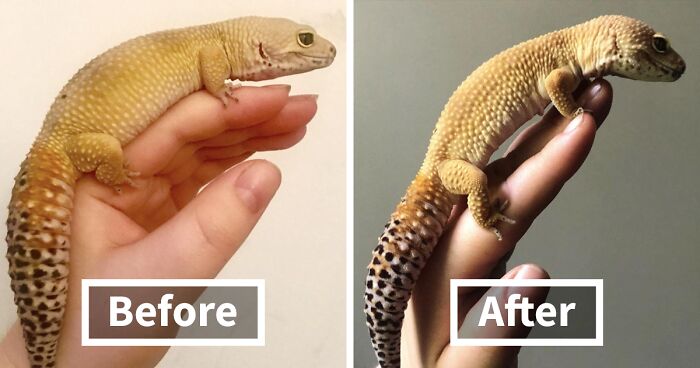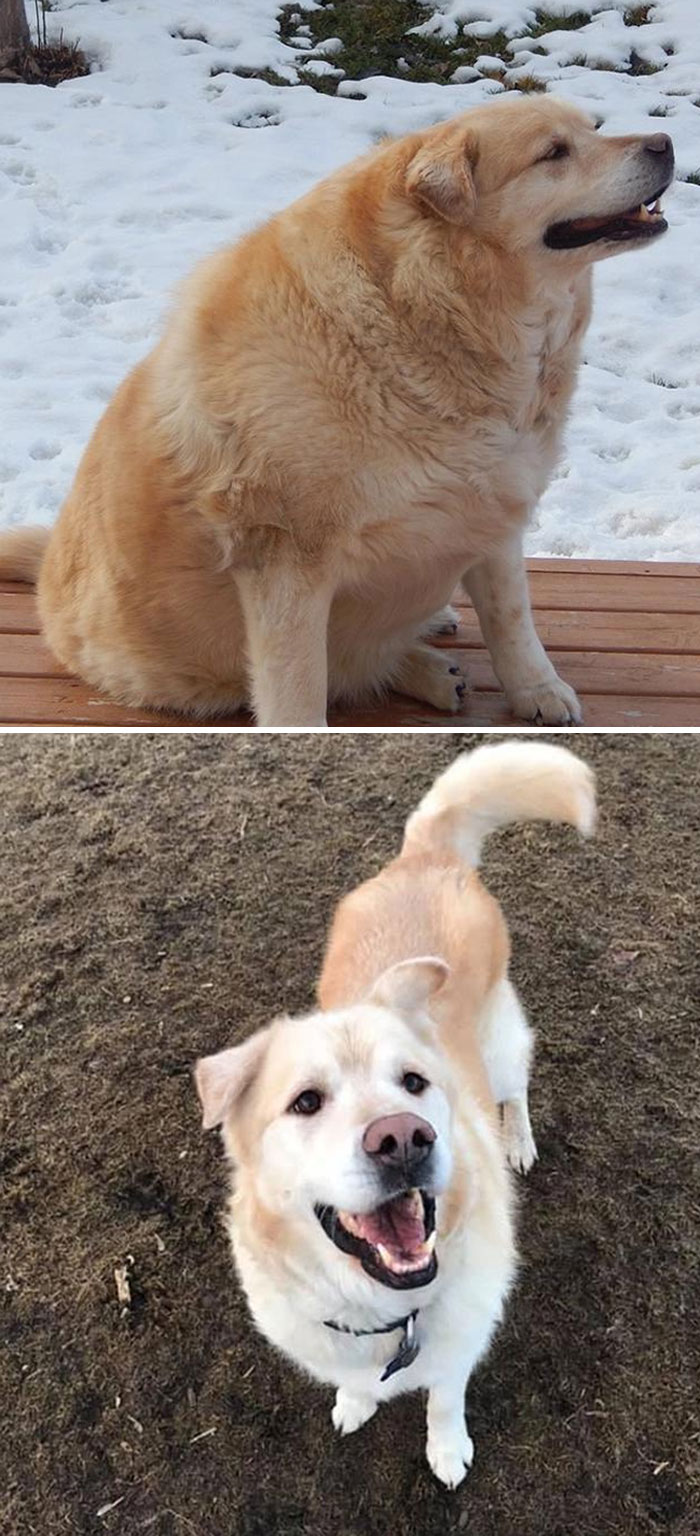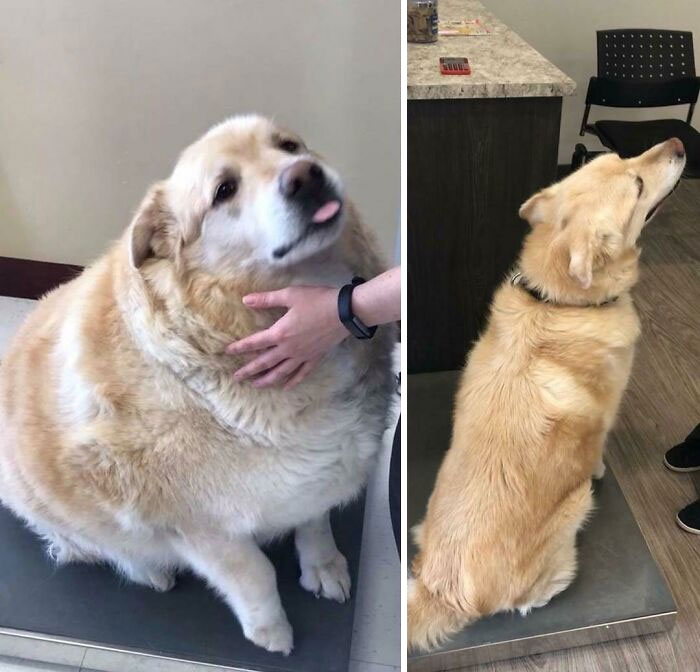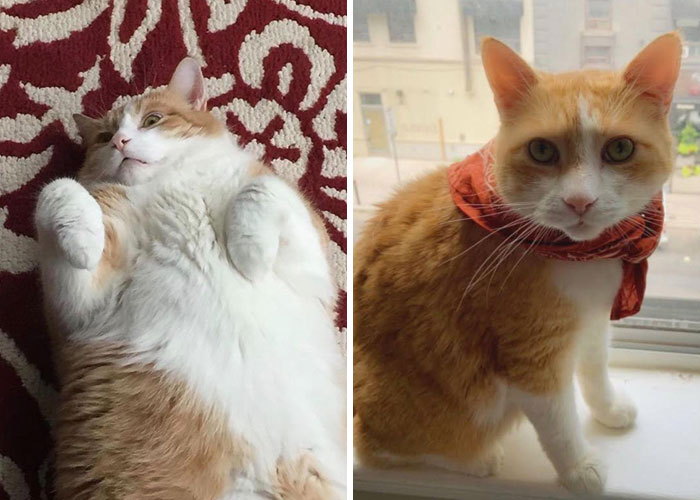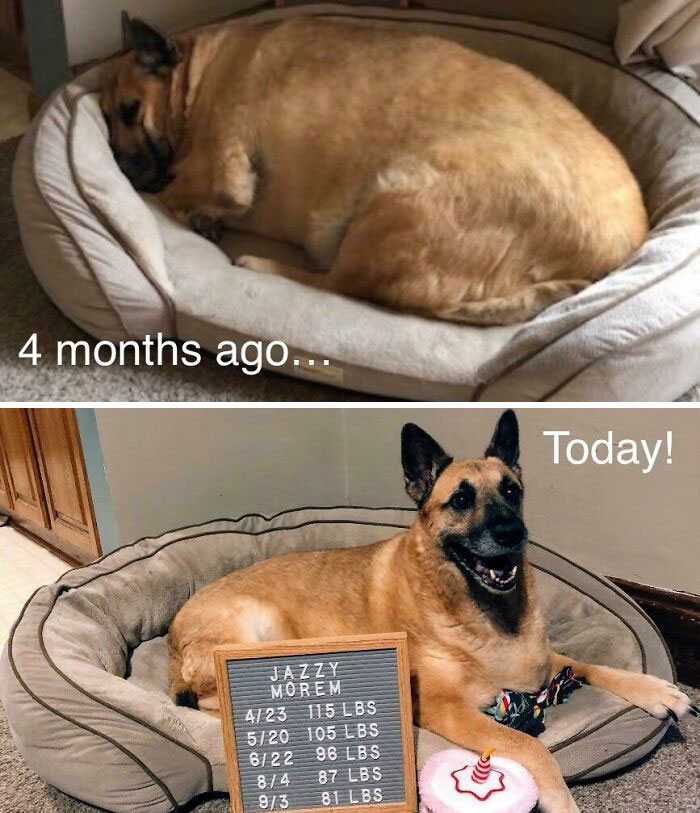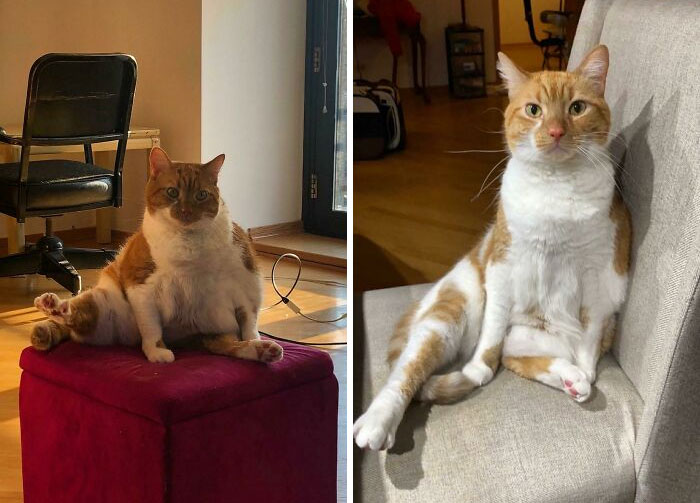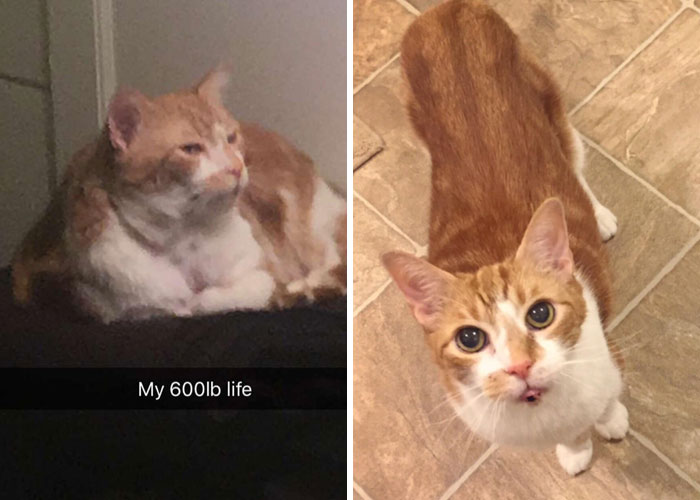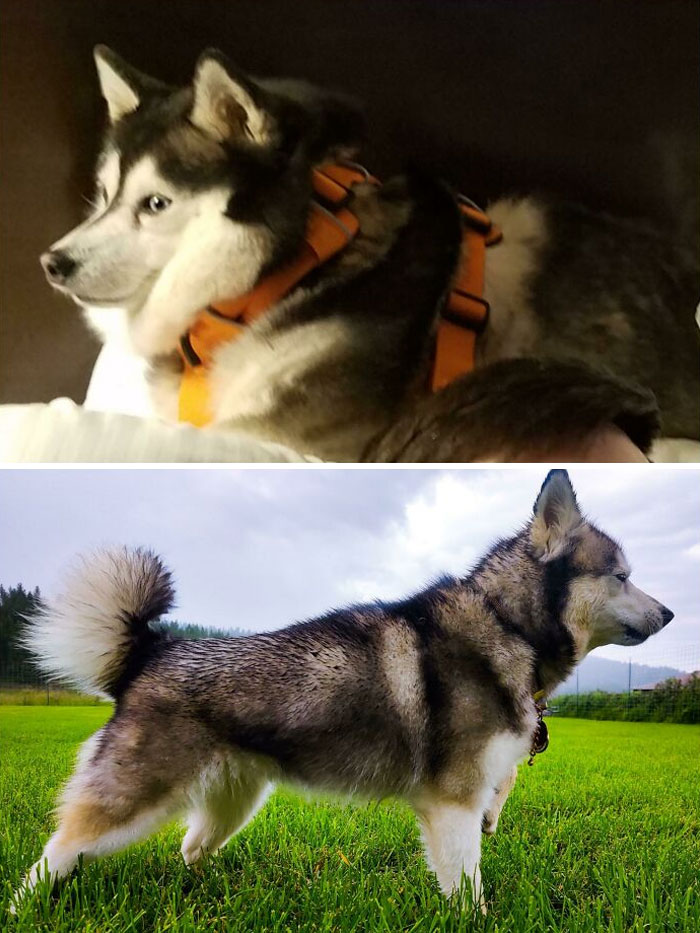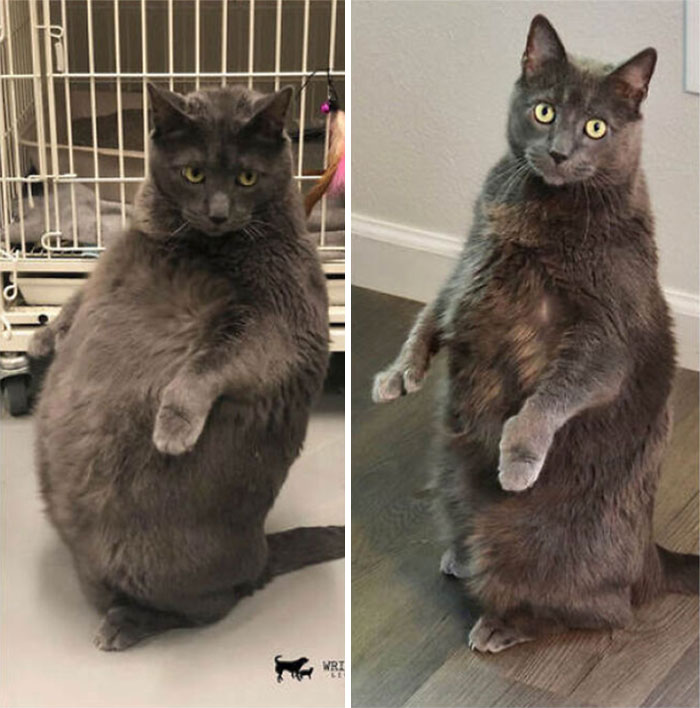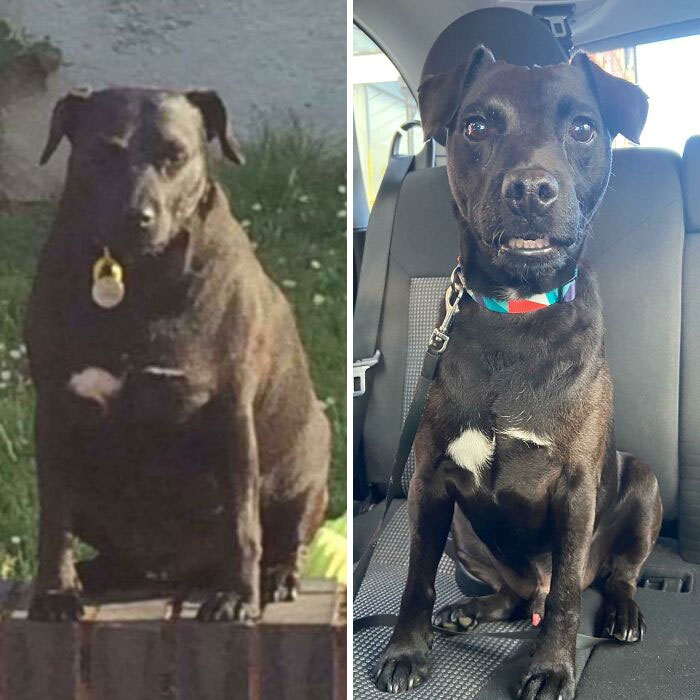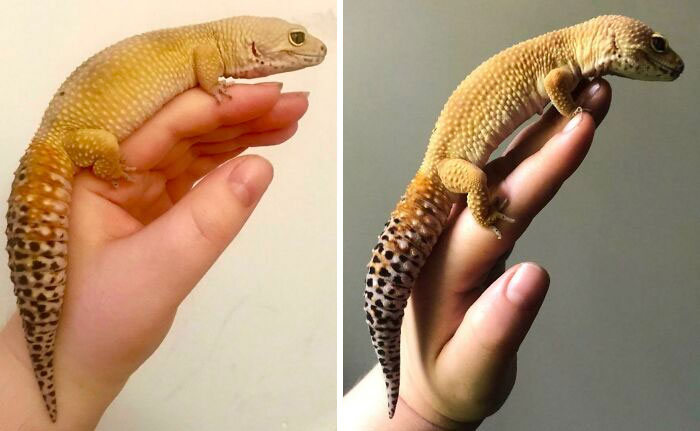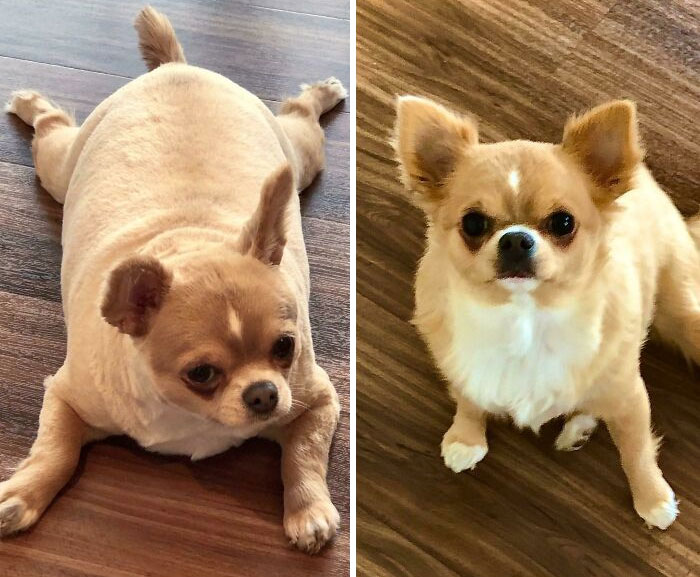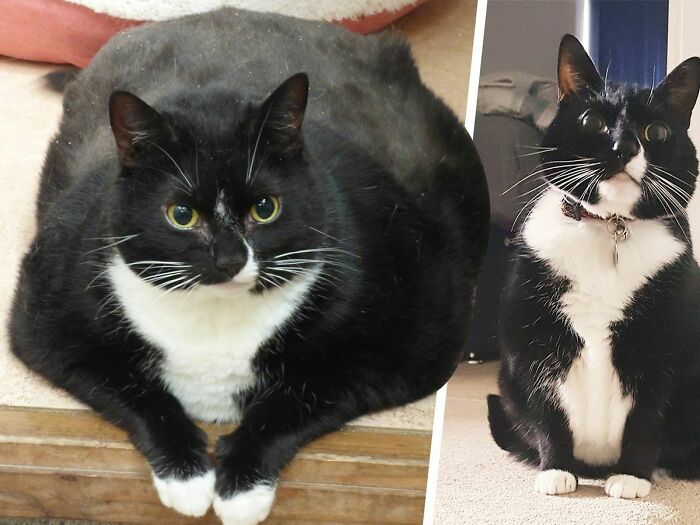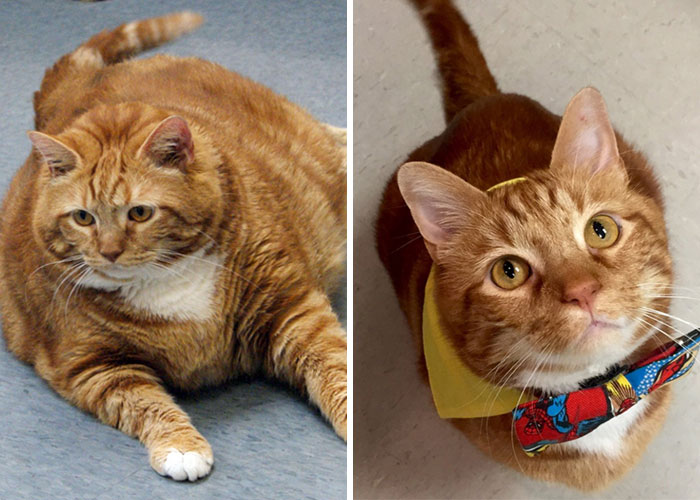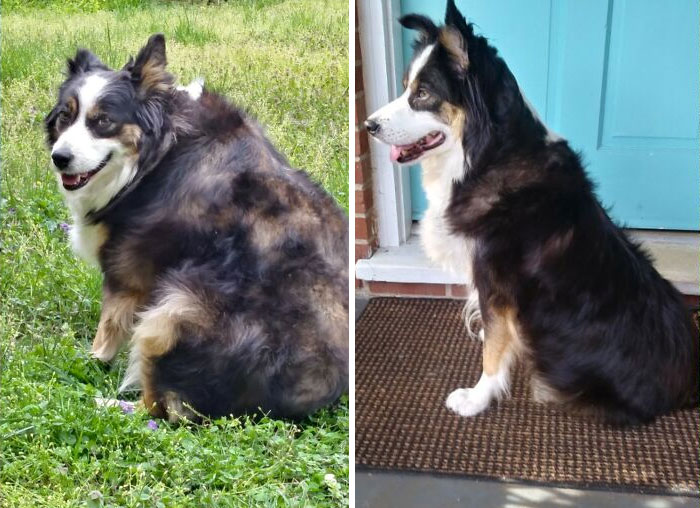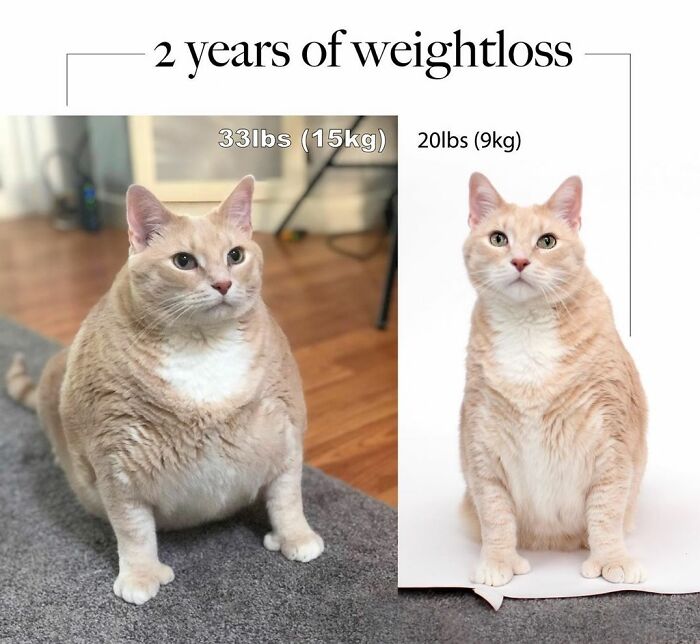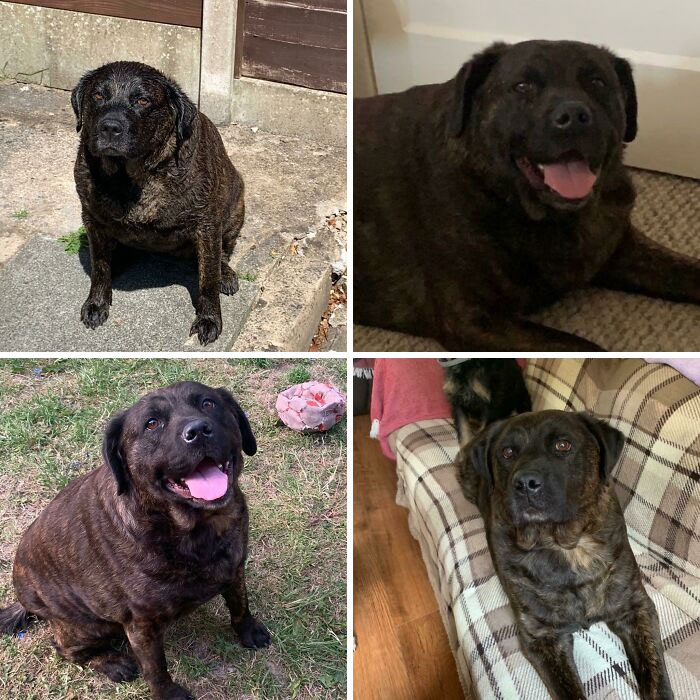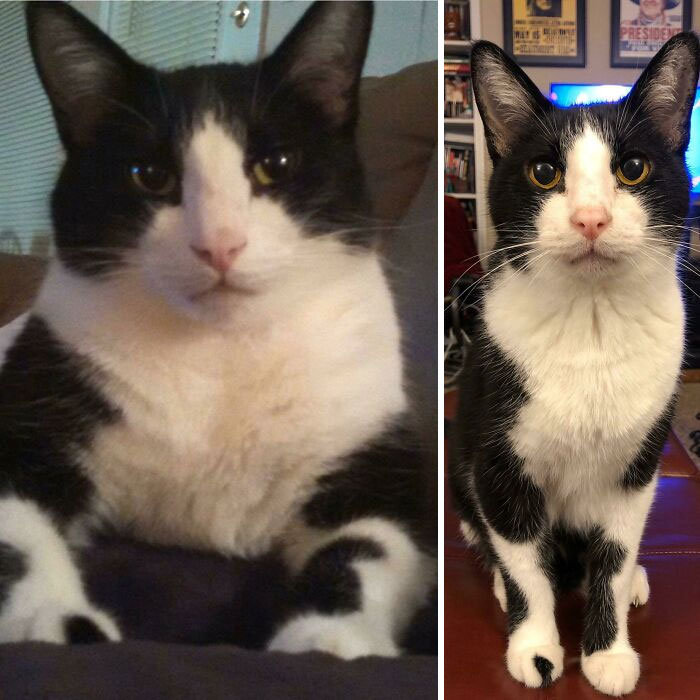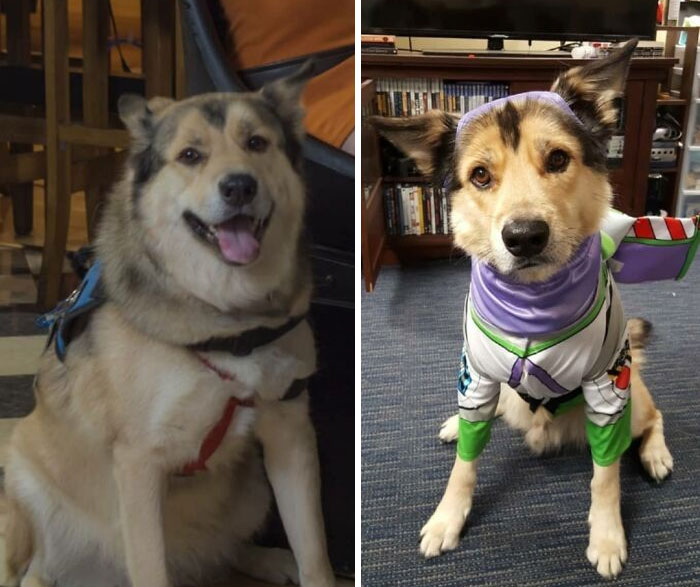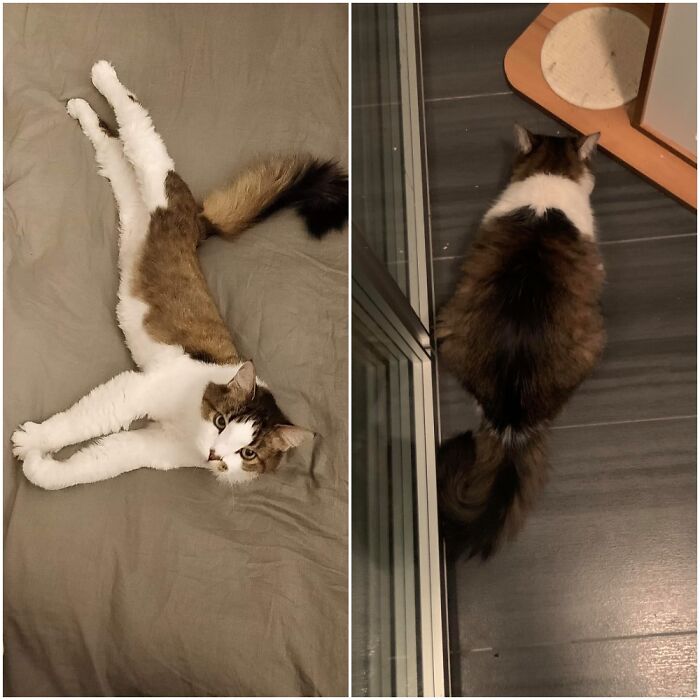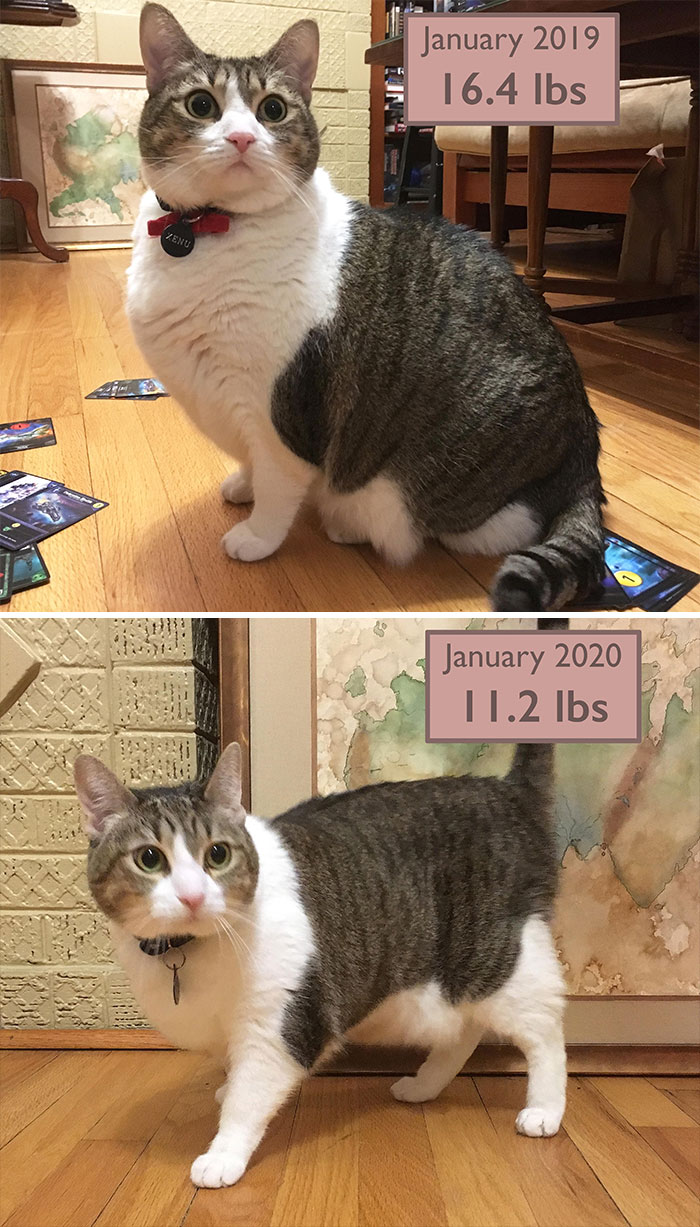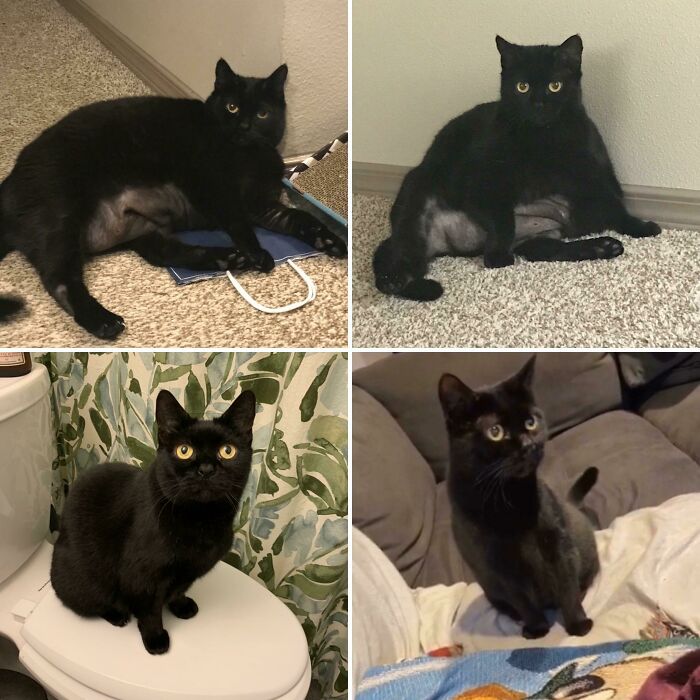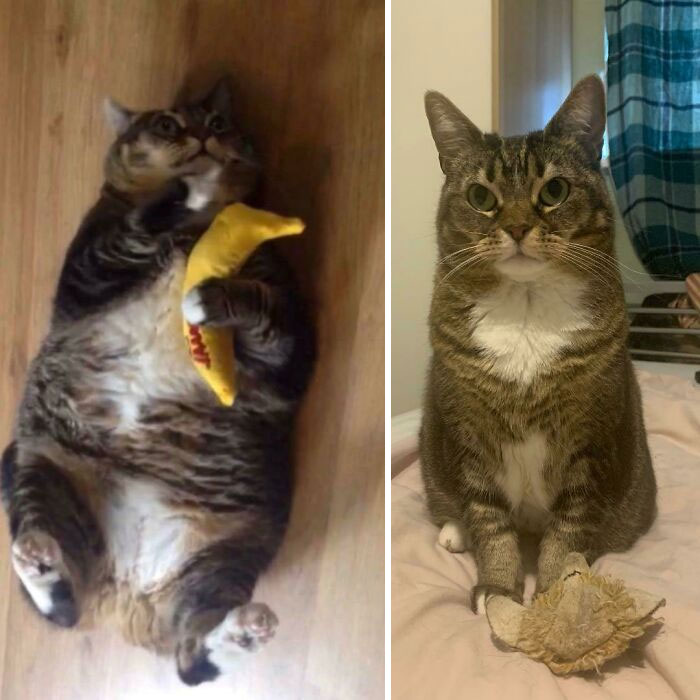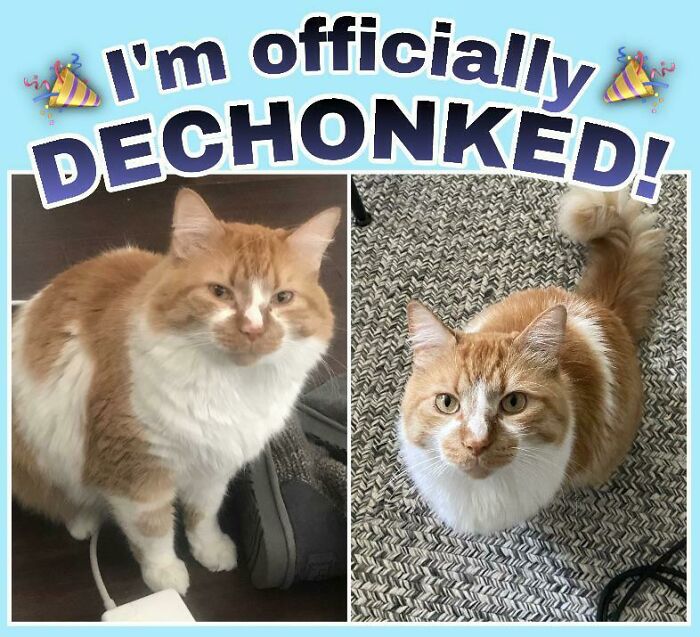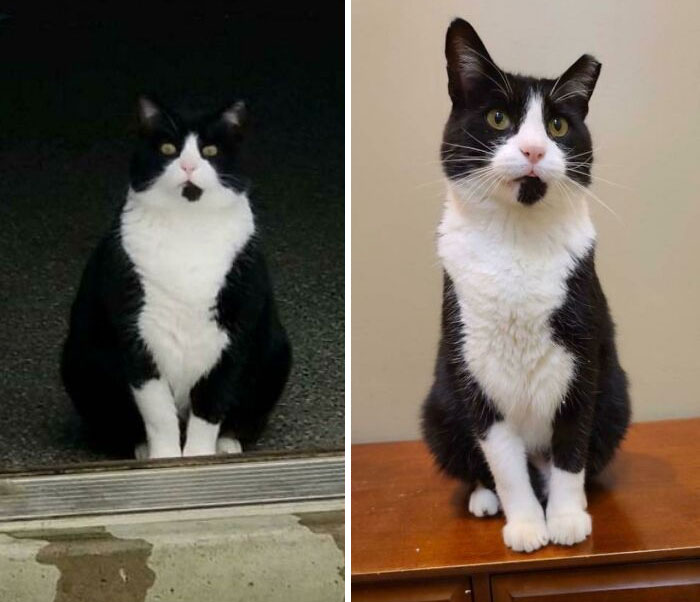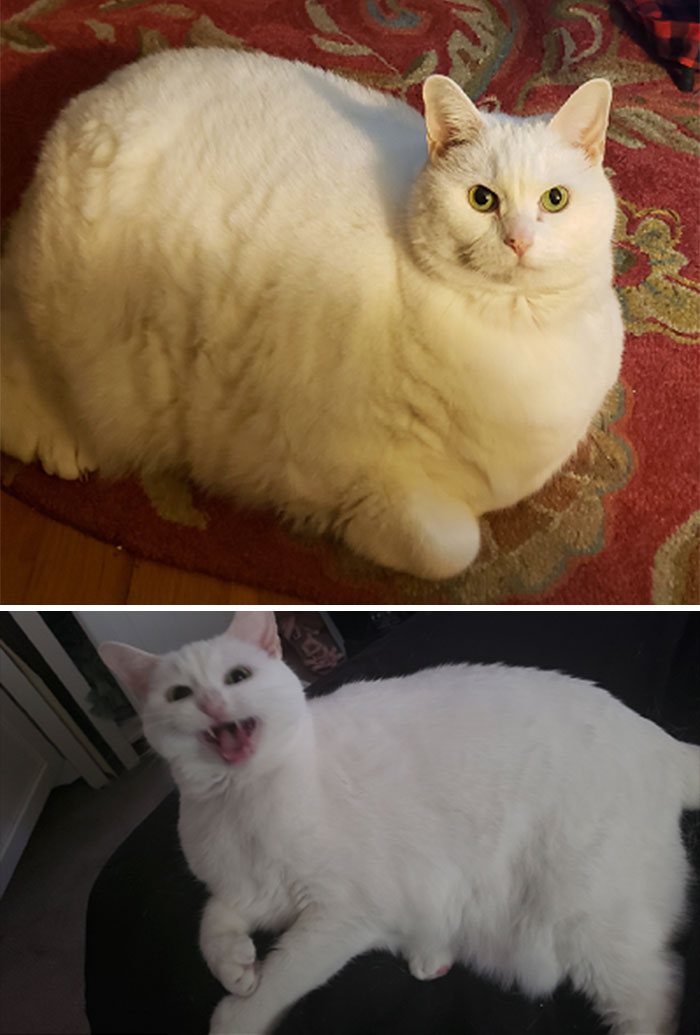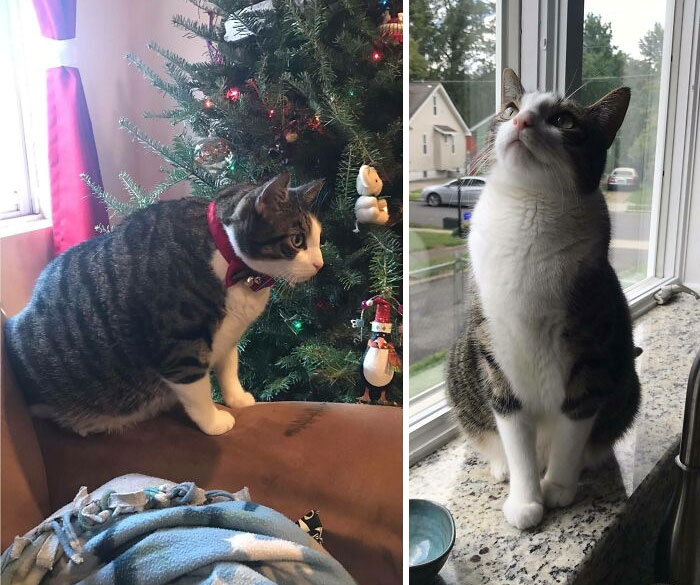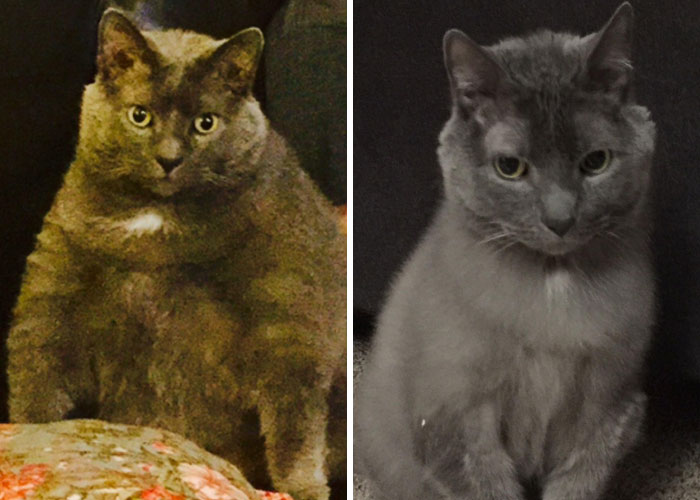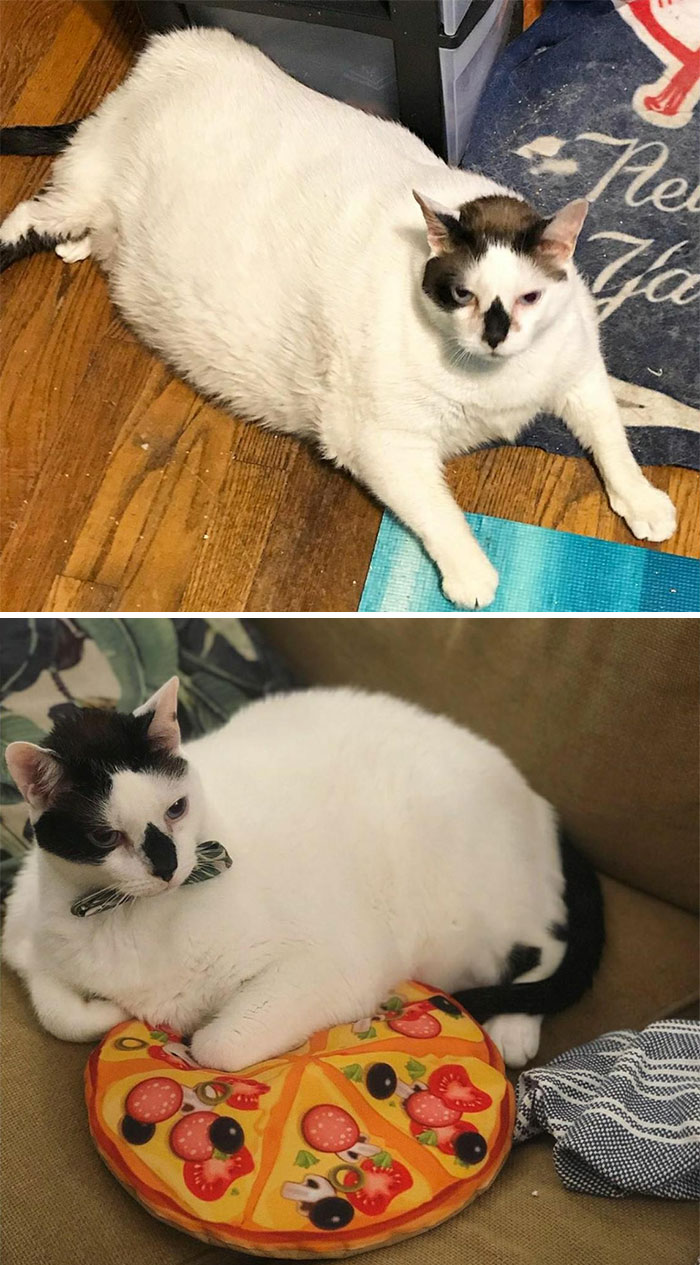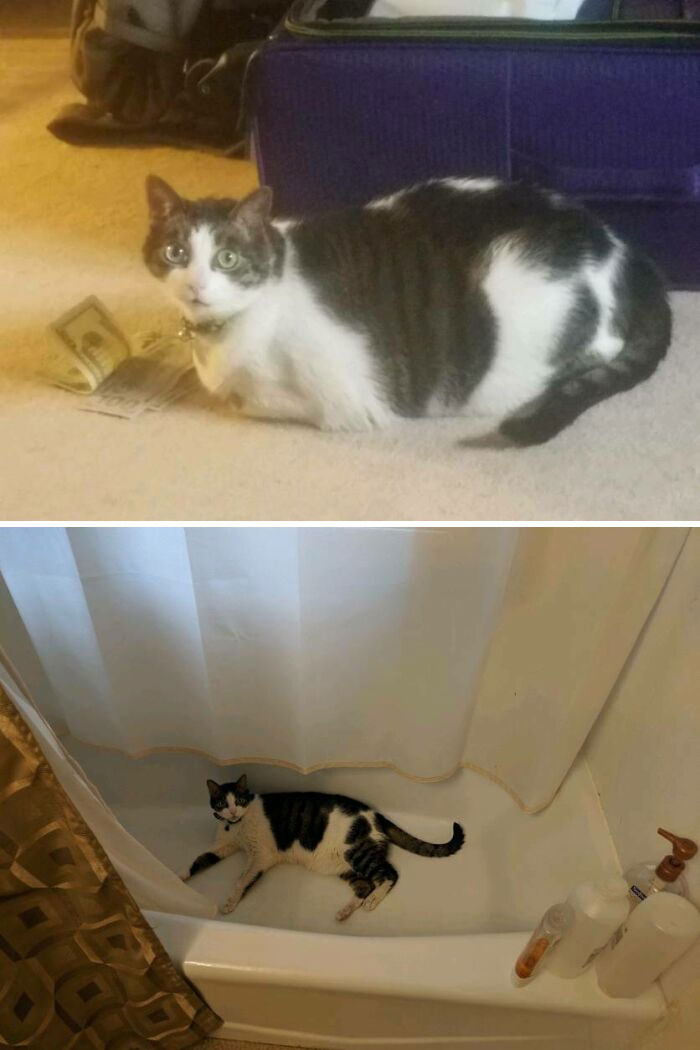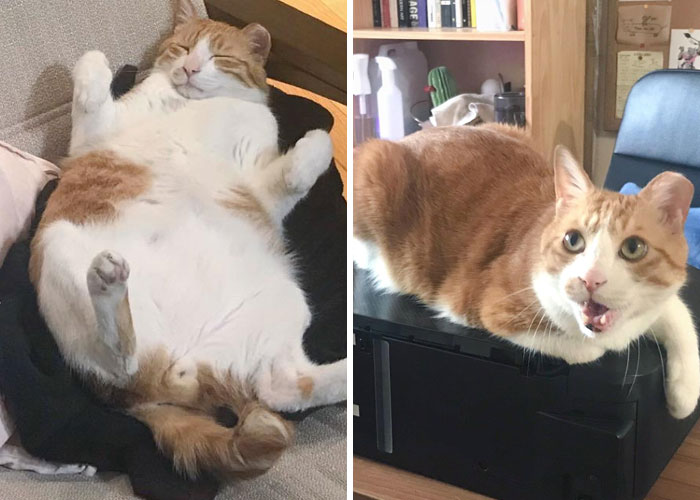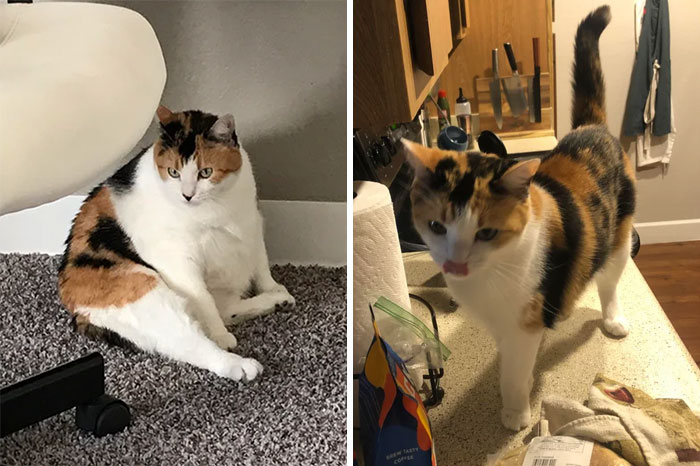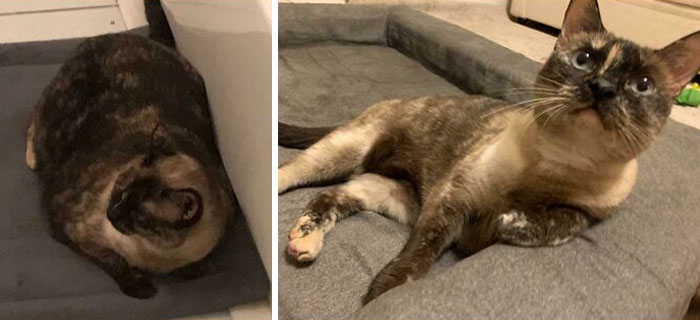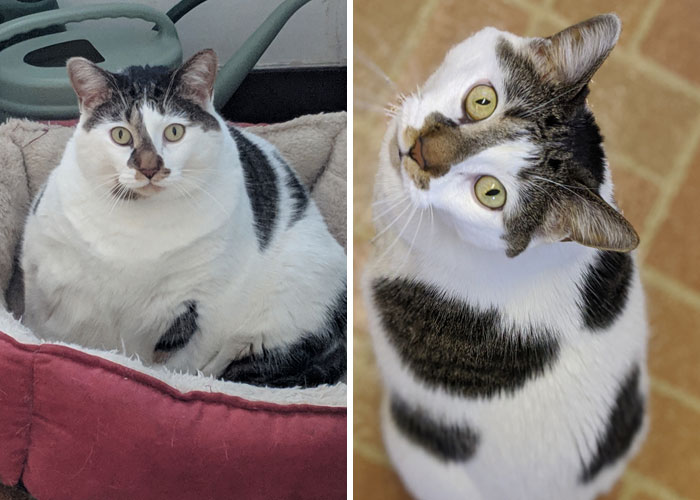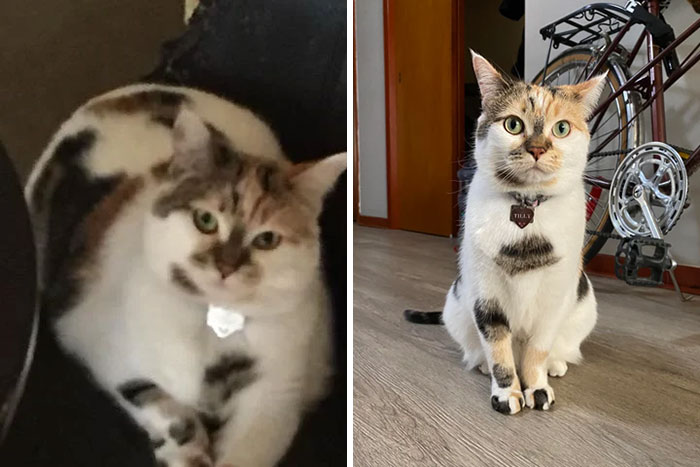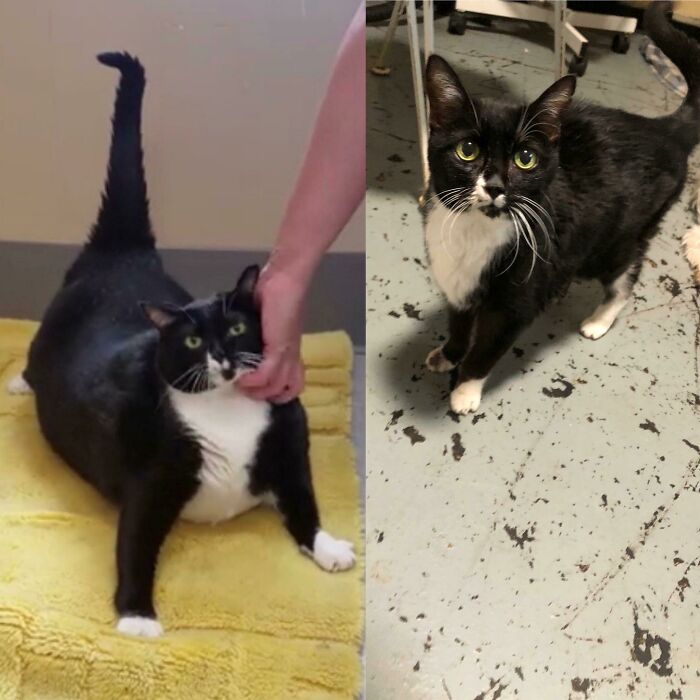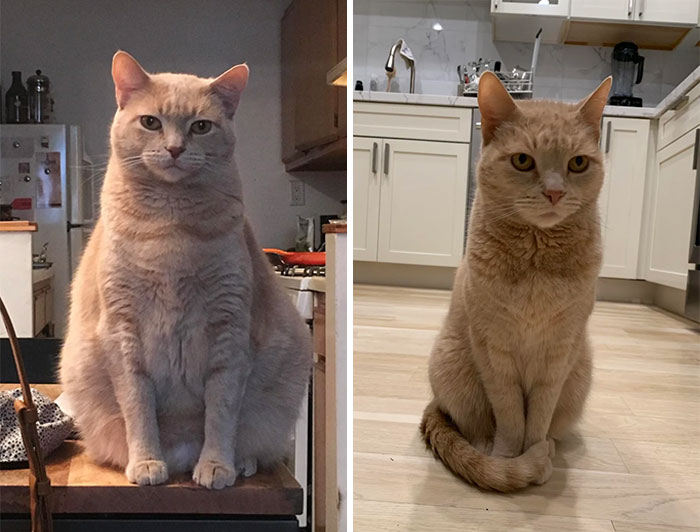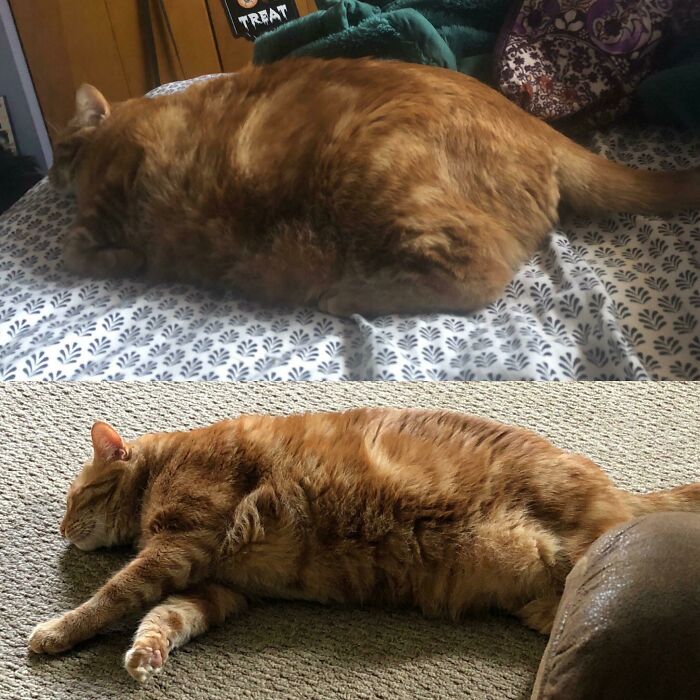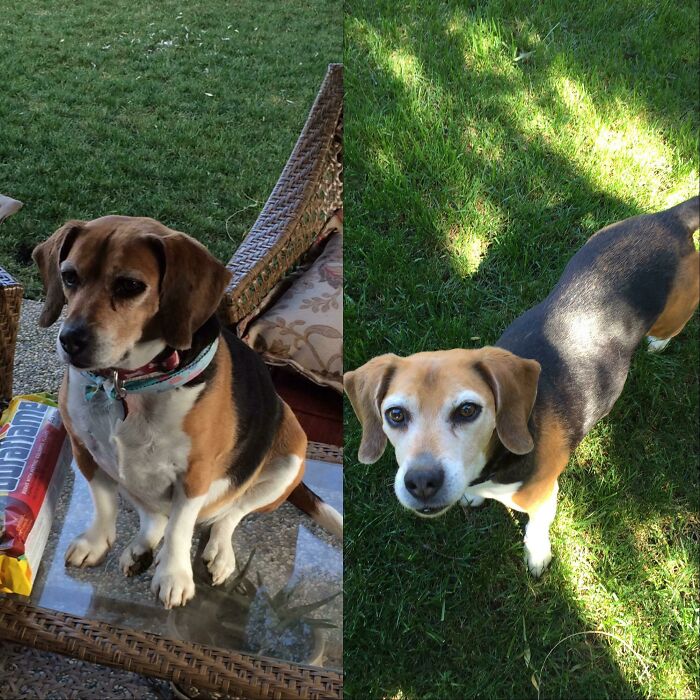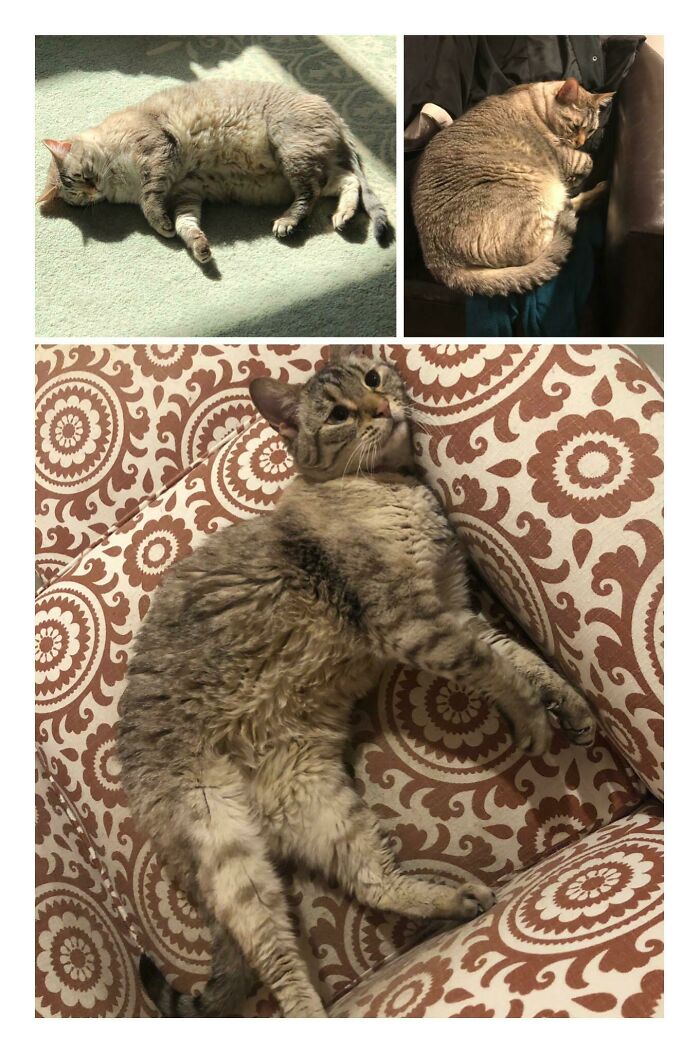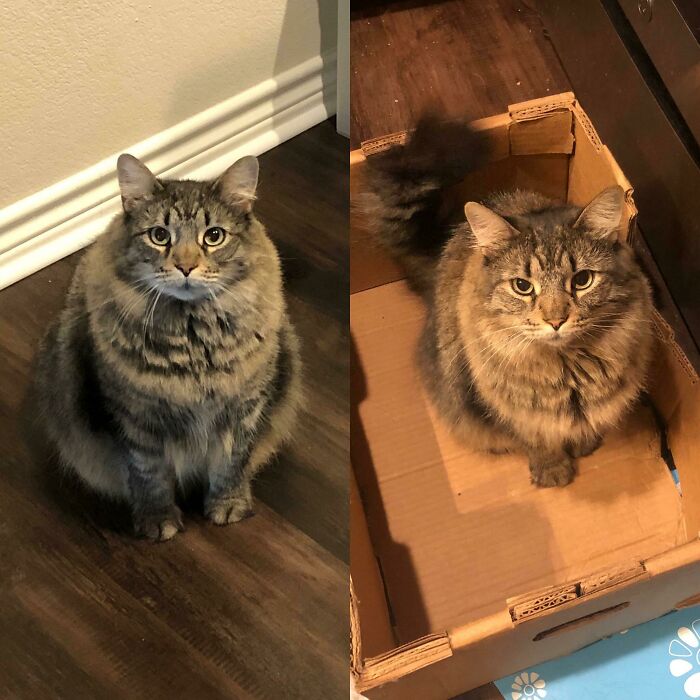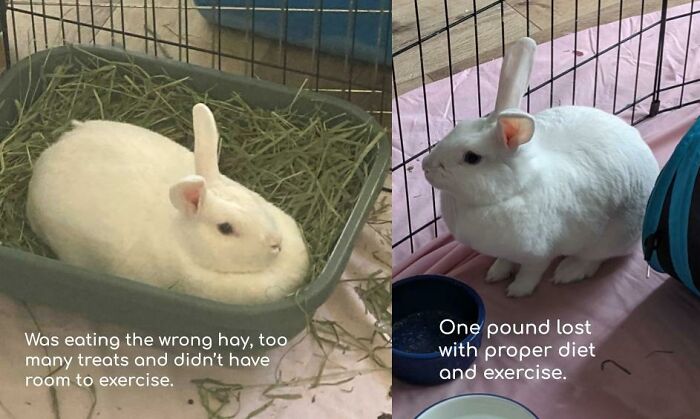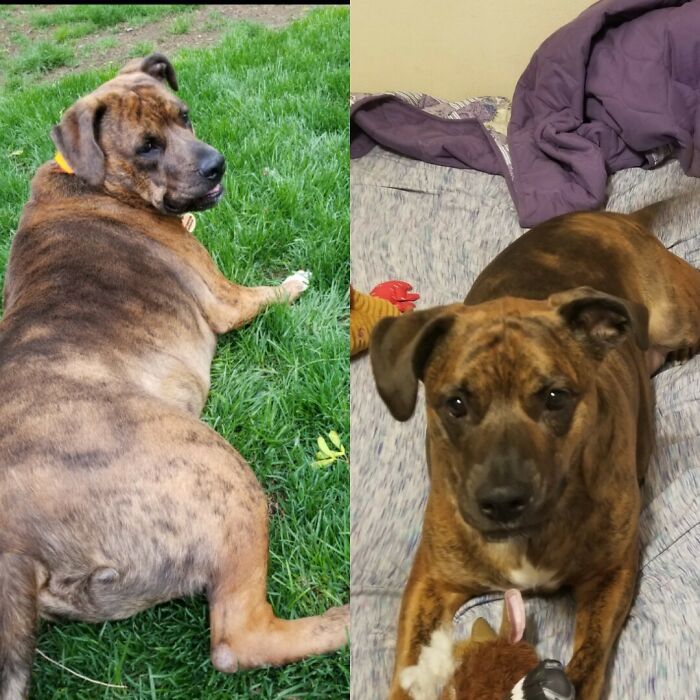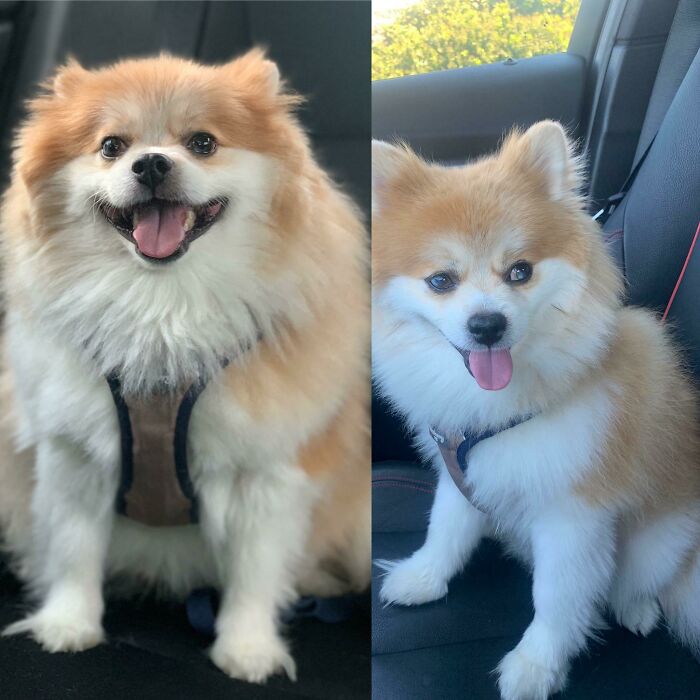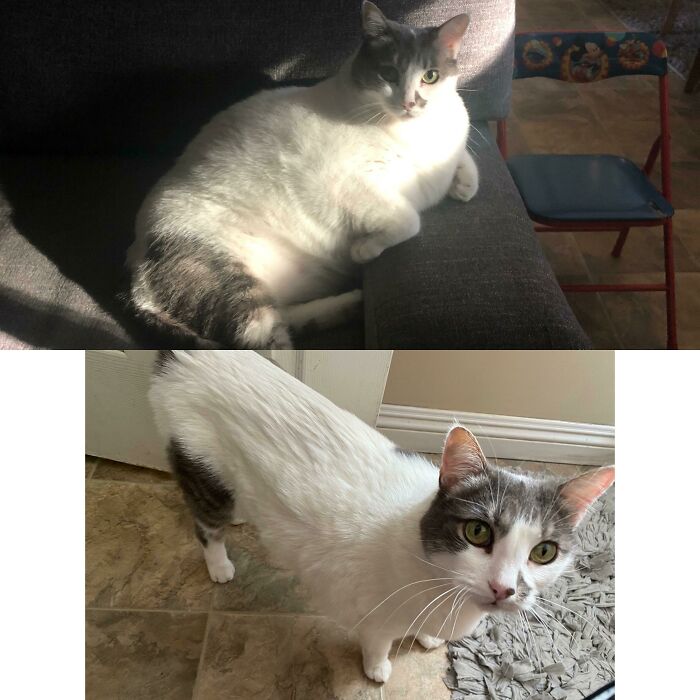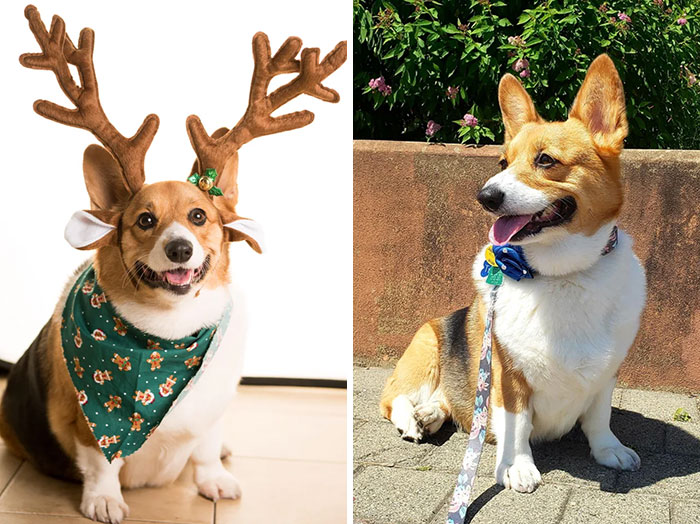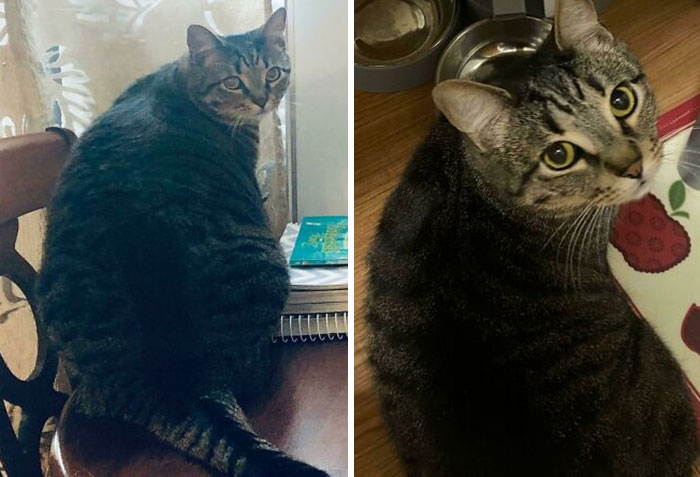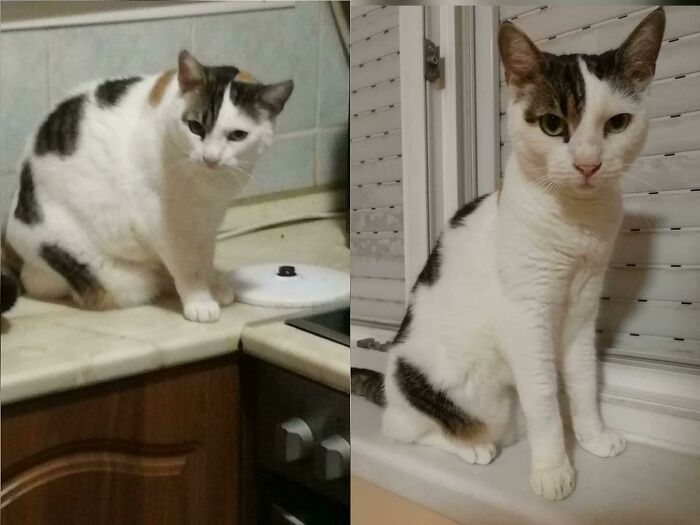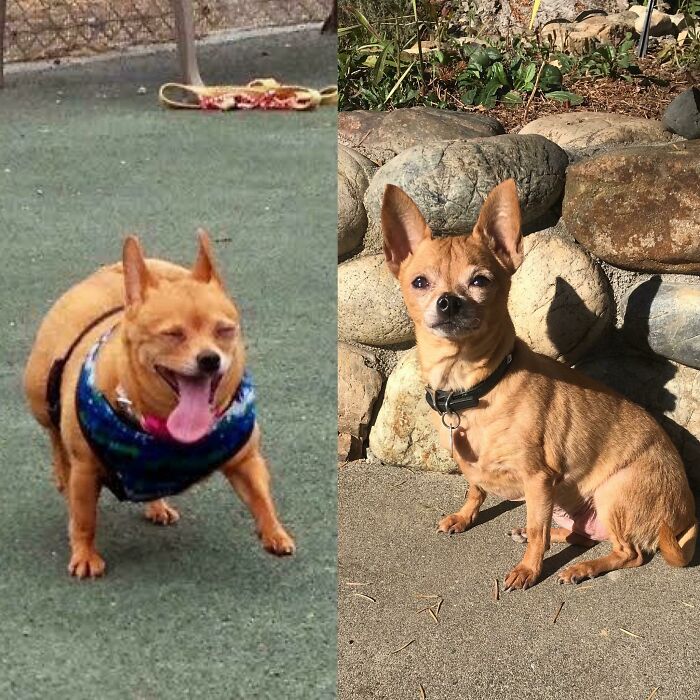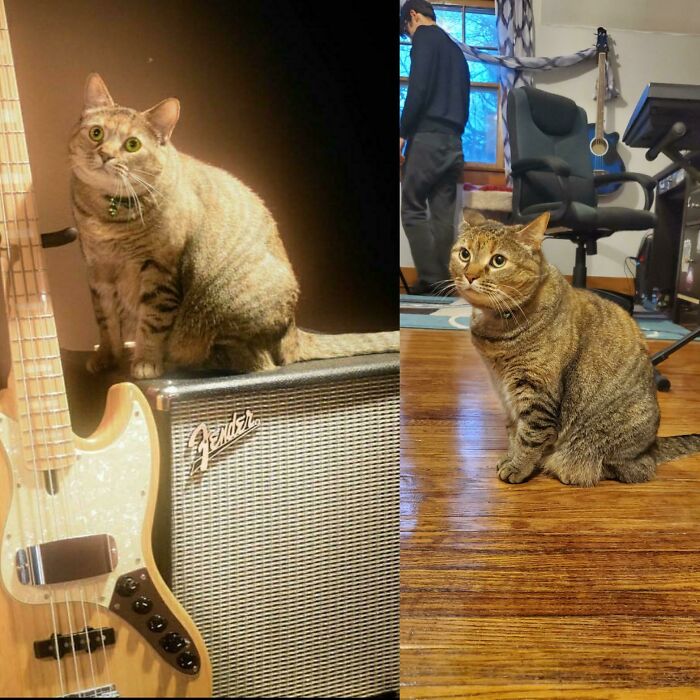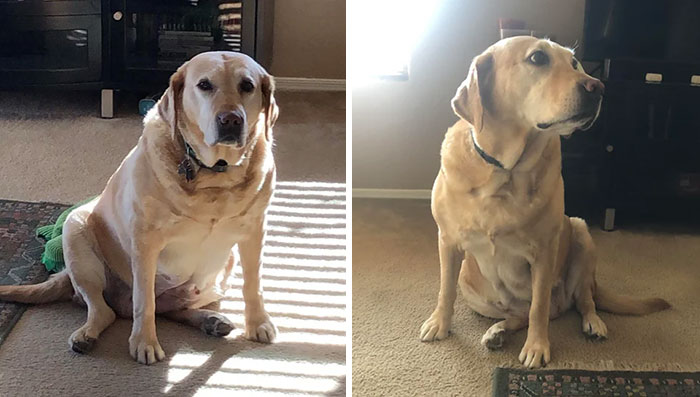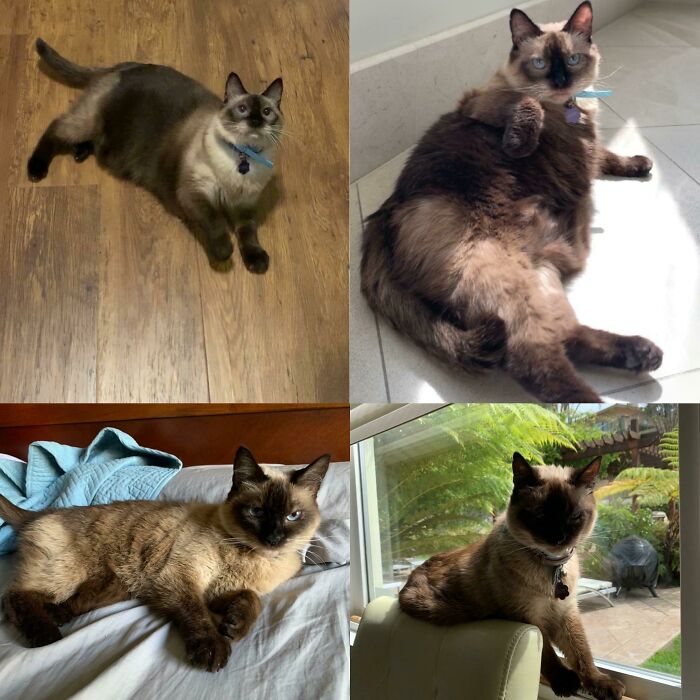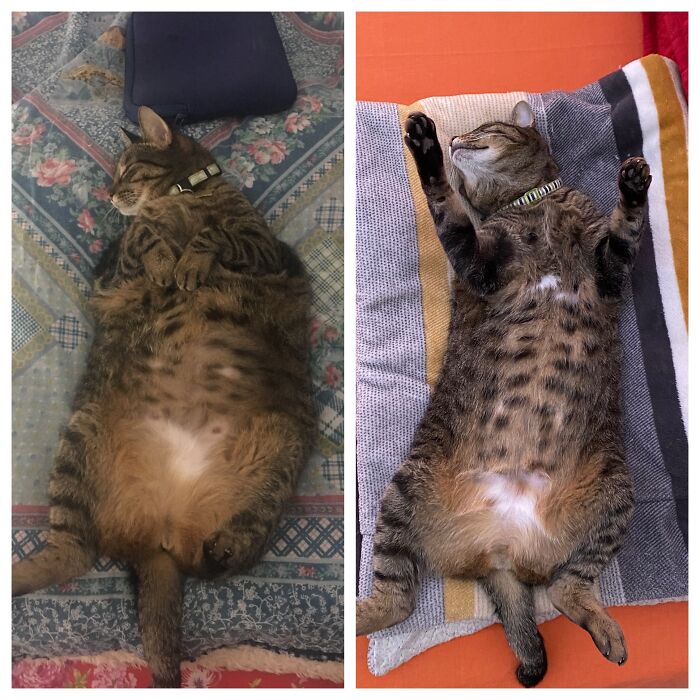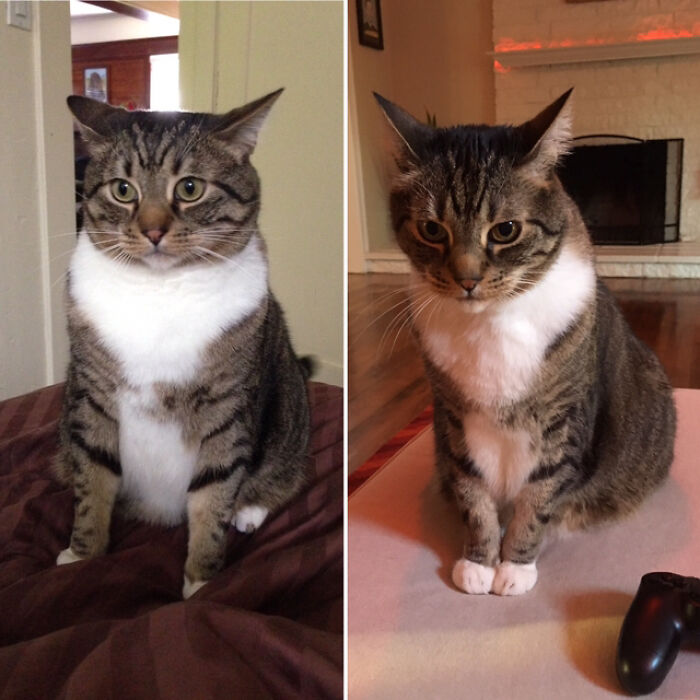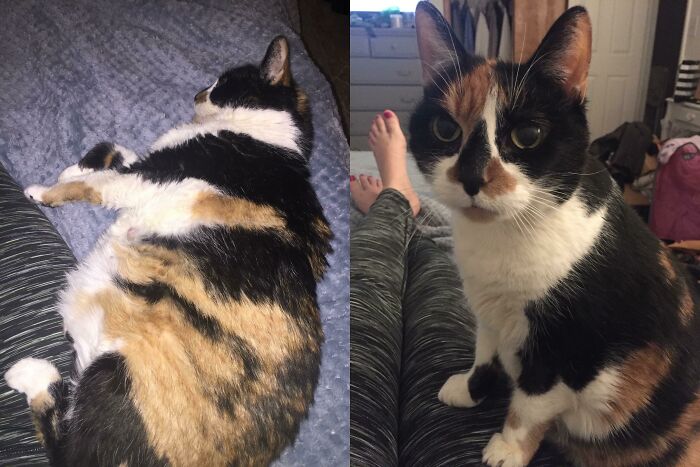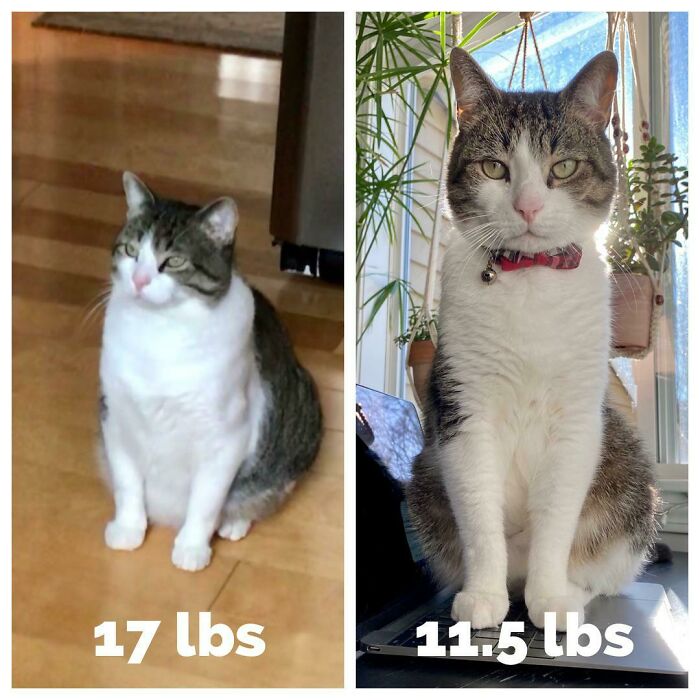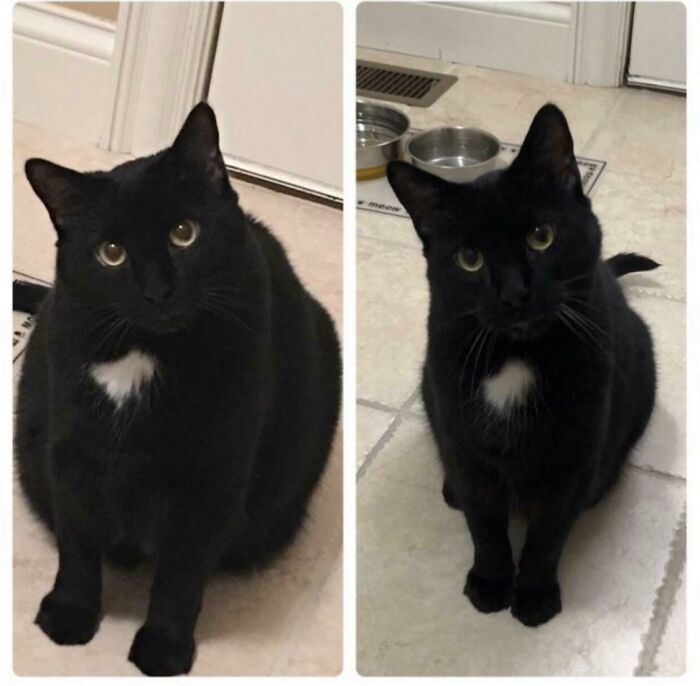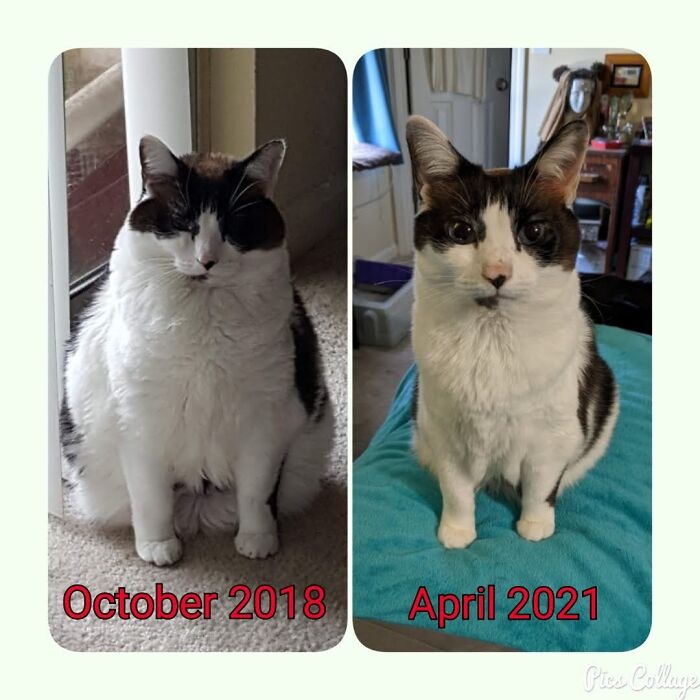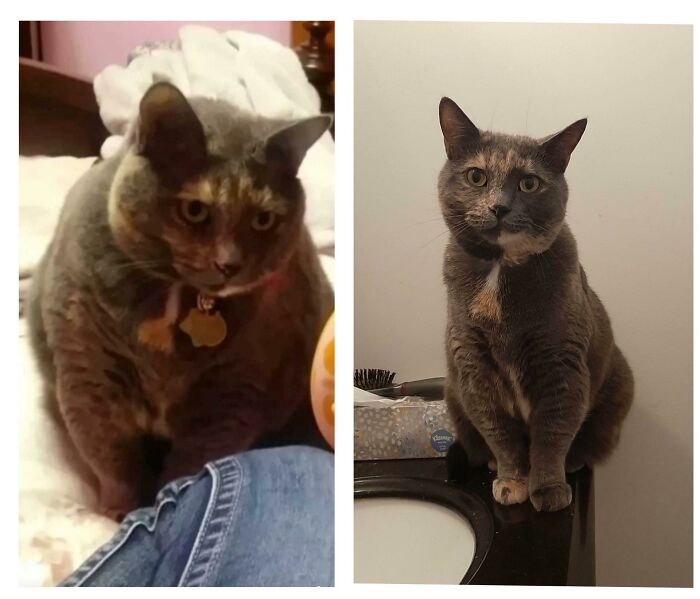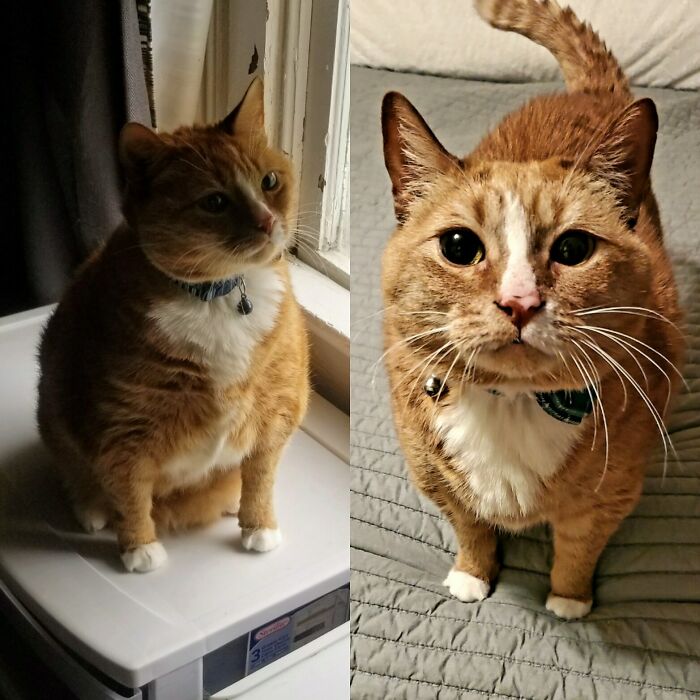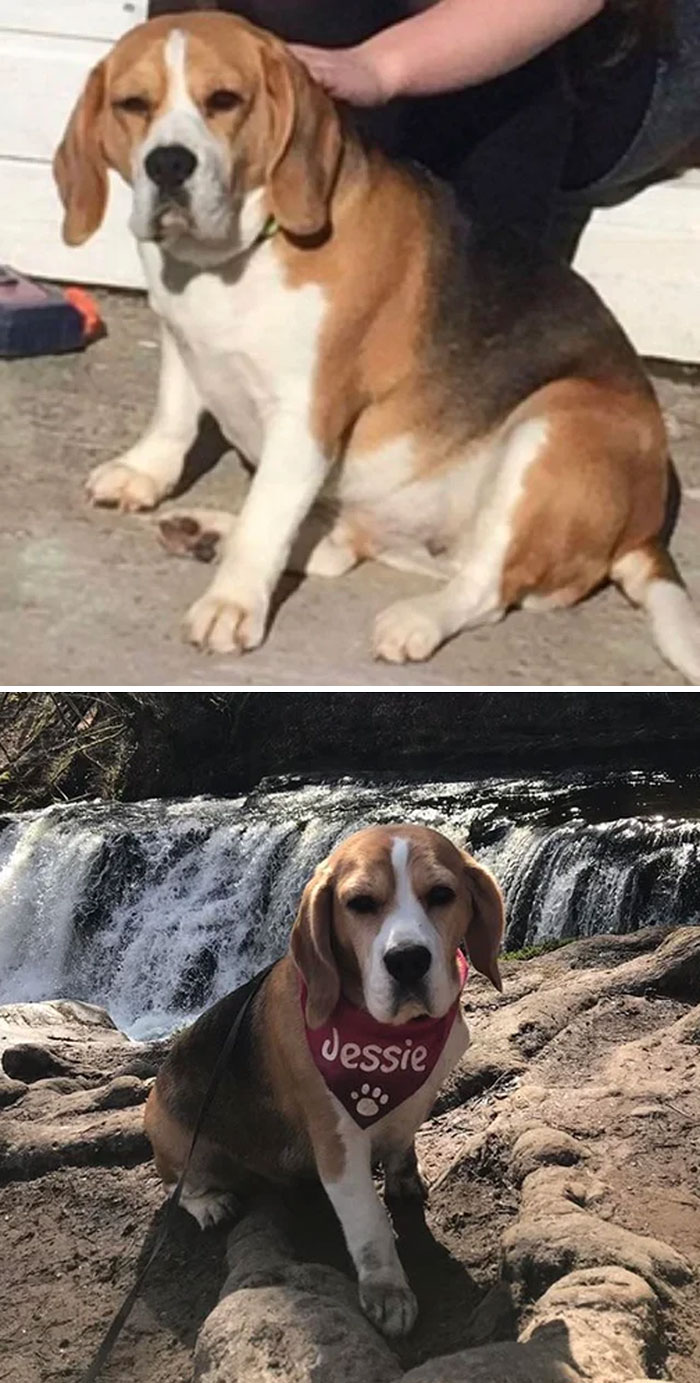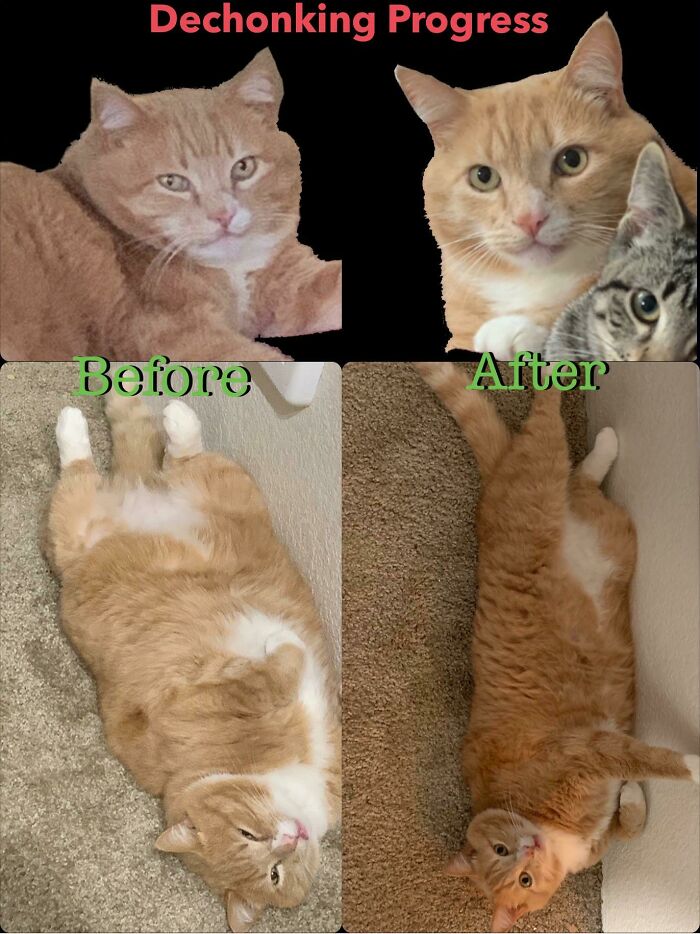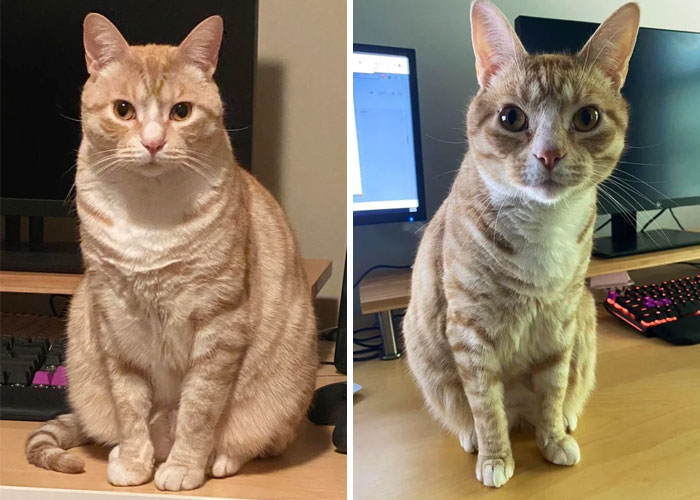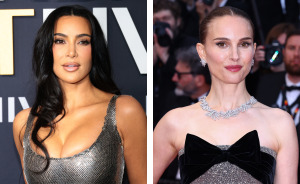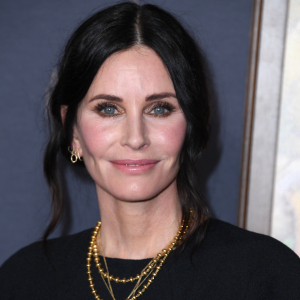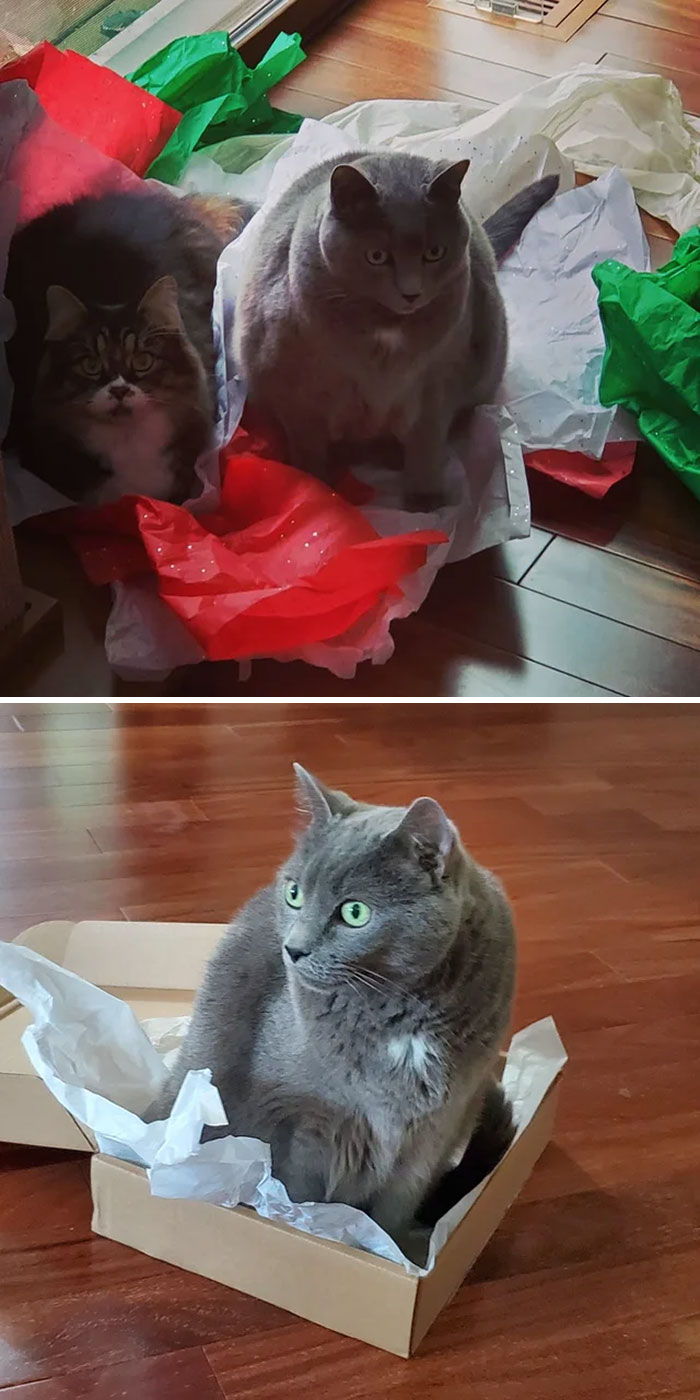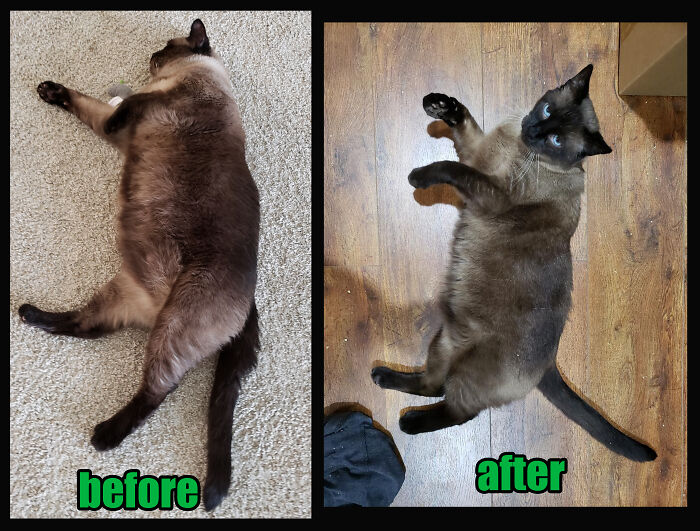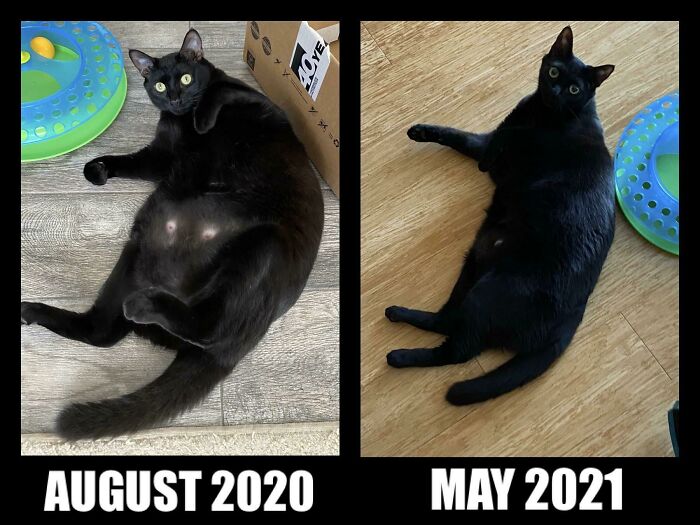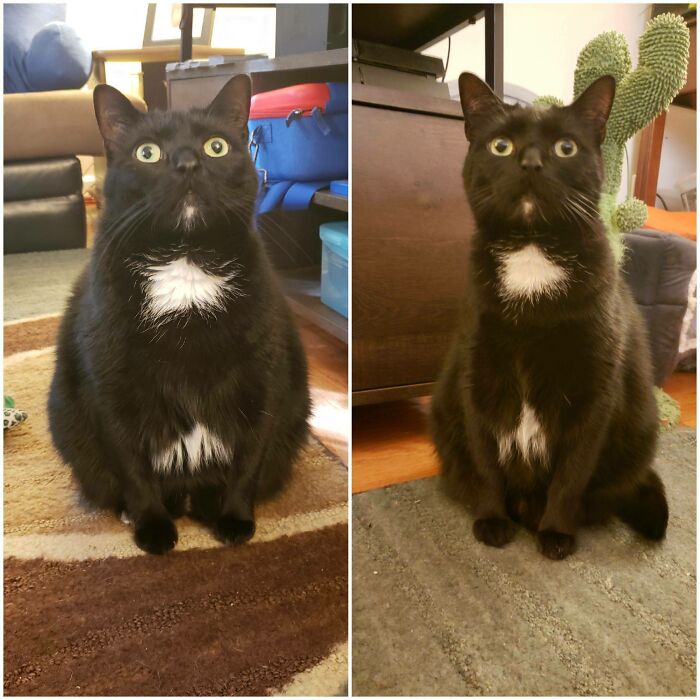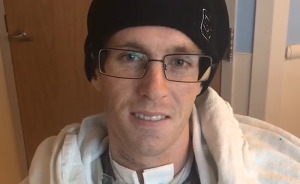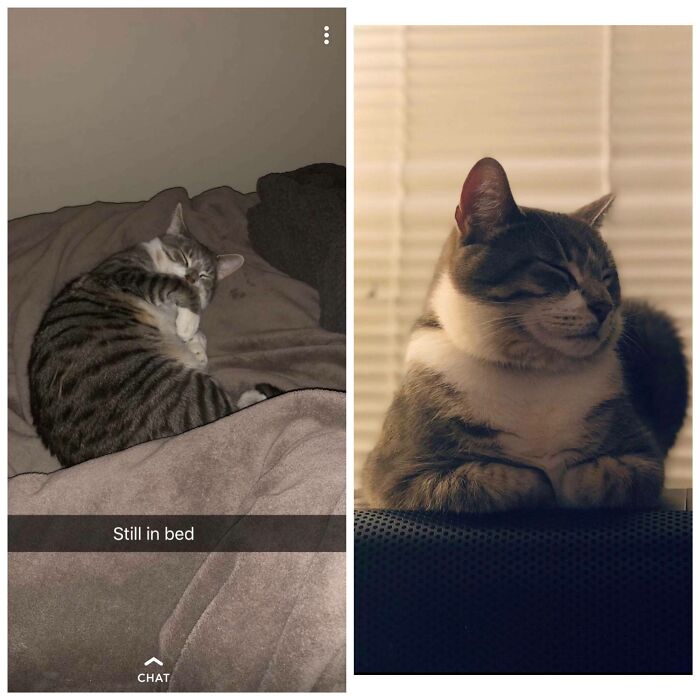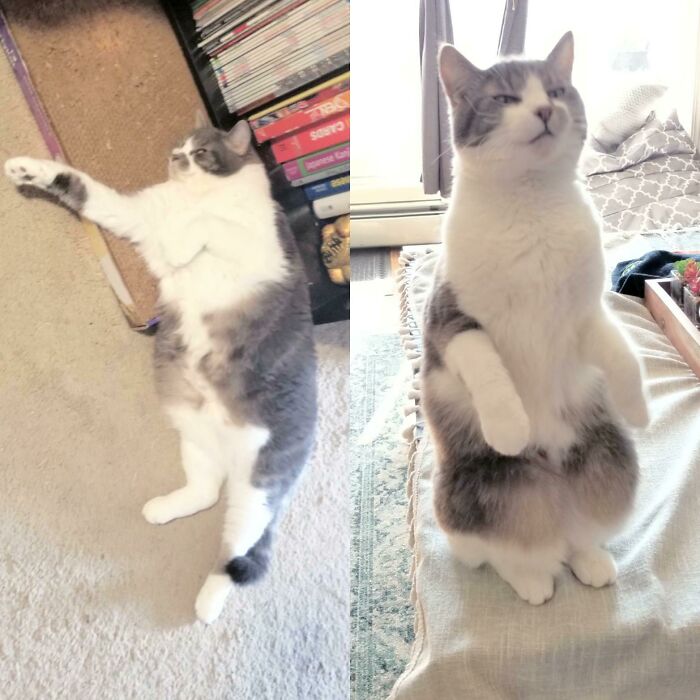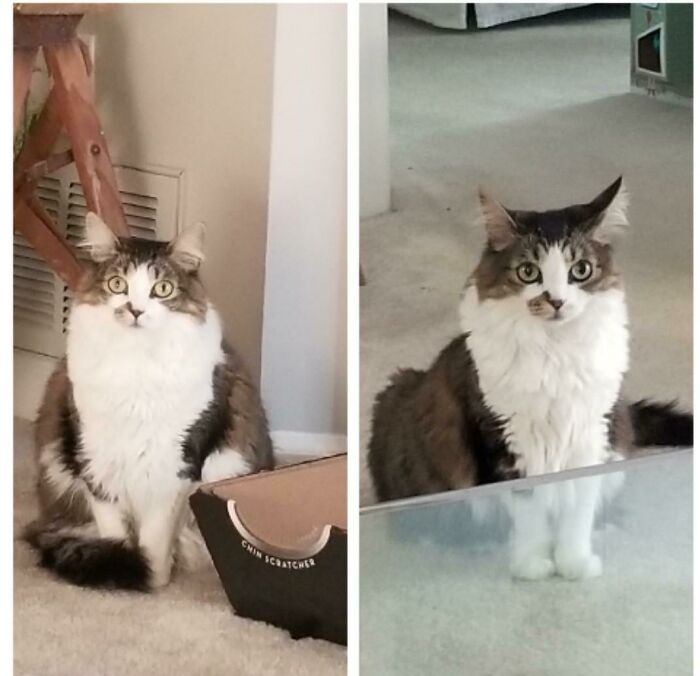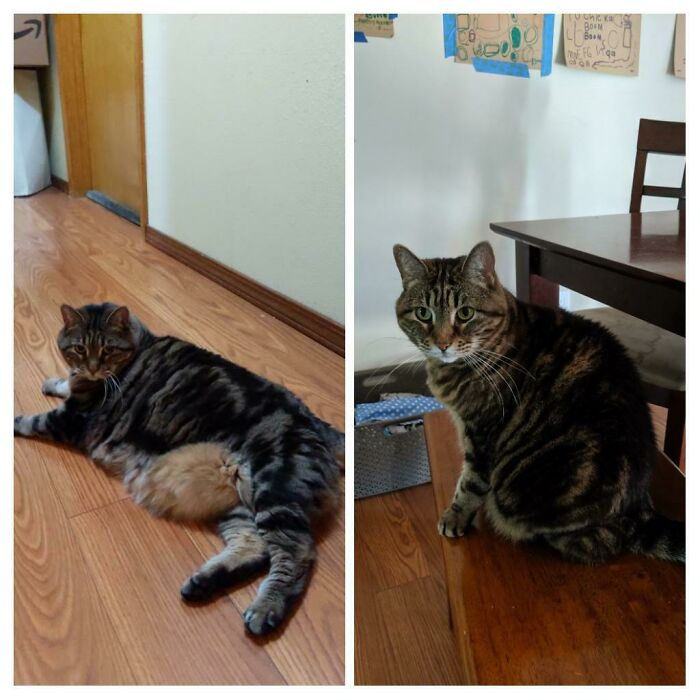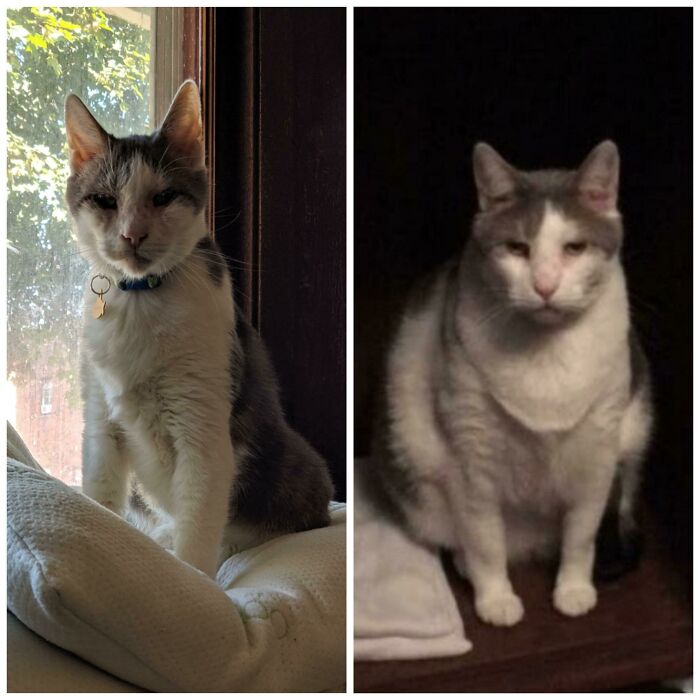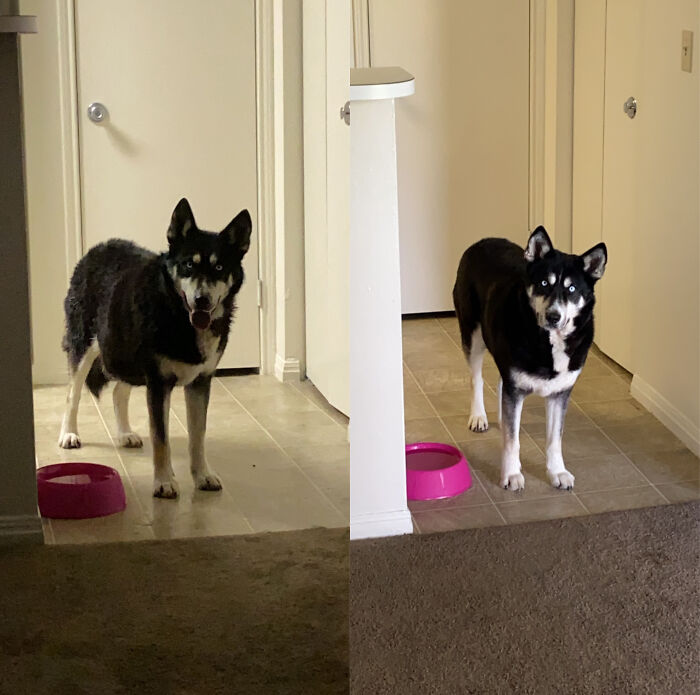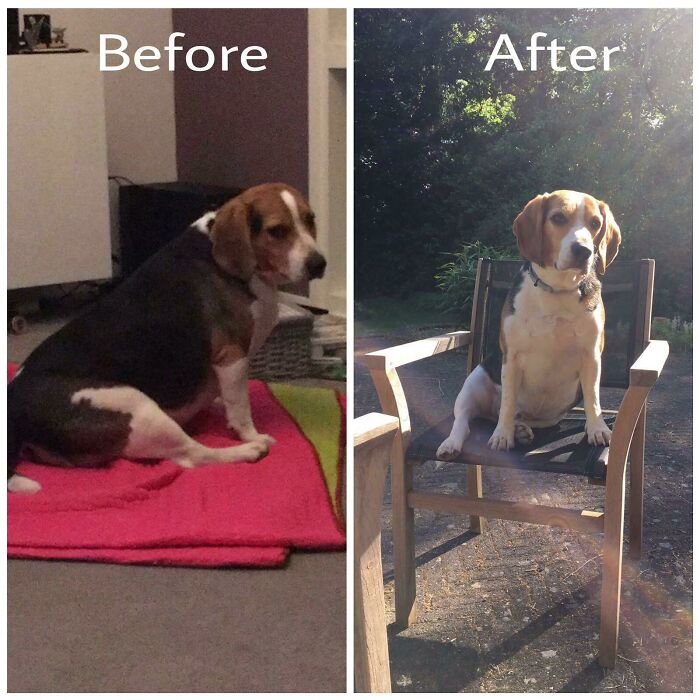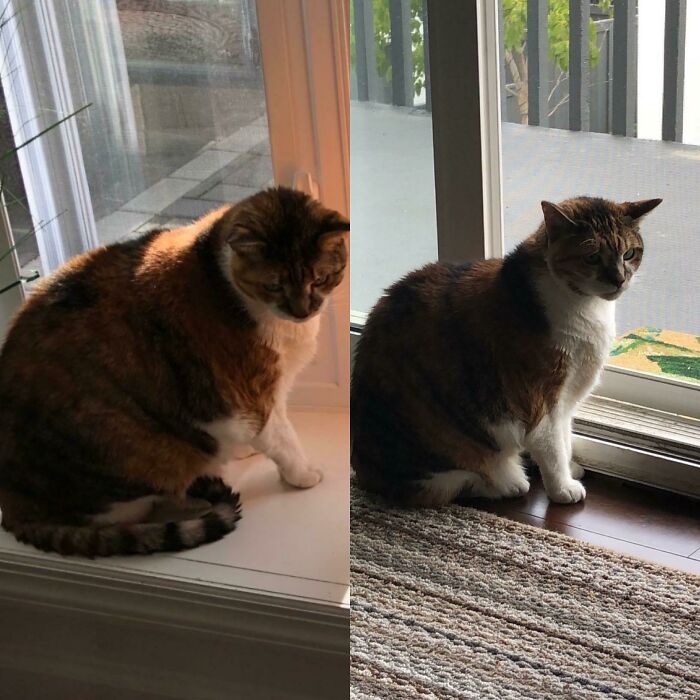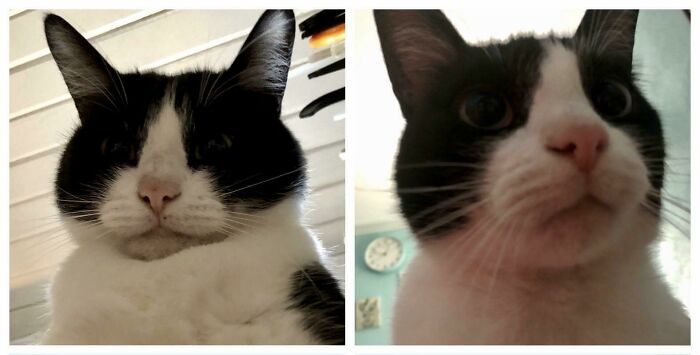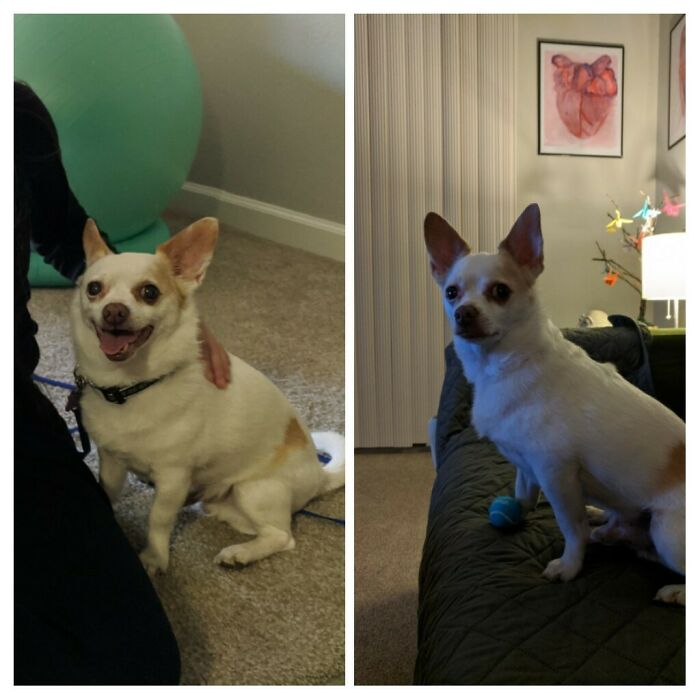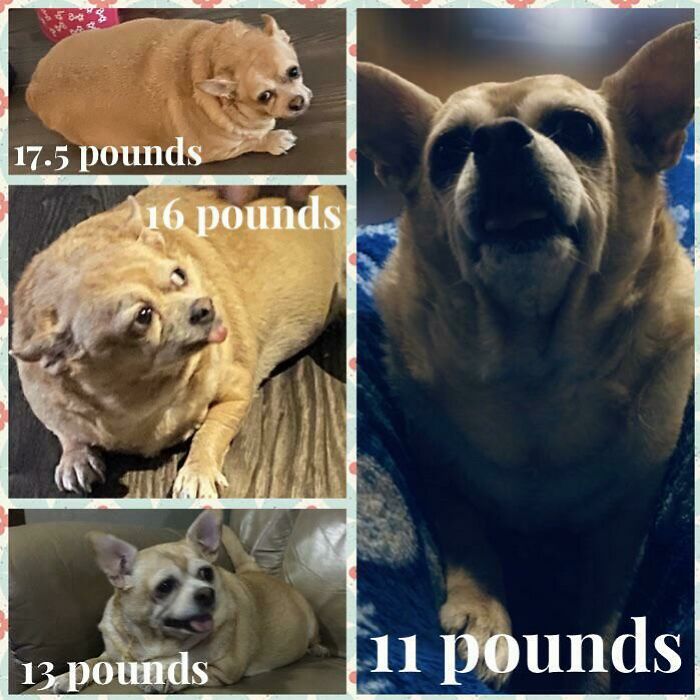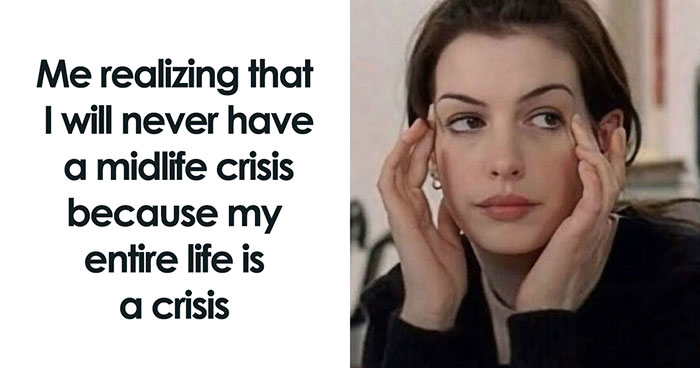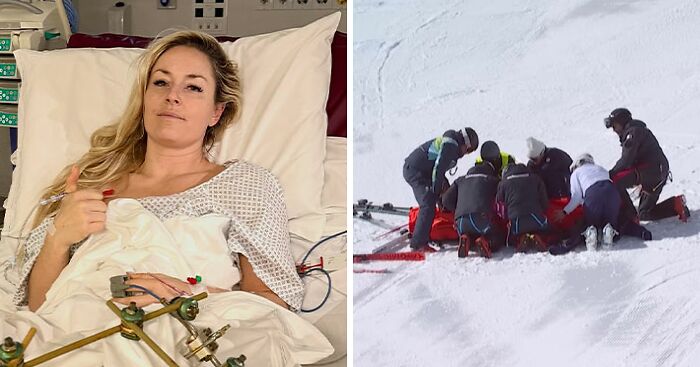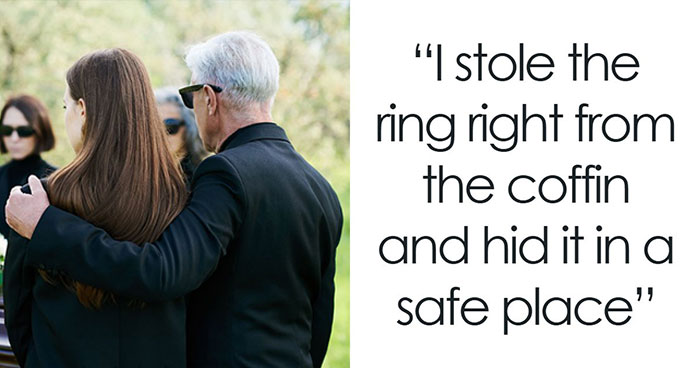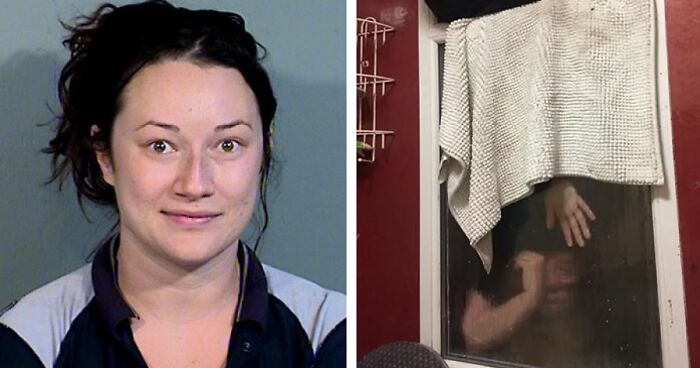Over 1.9 billion human adults are overweight. Of these, more than 650 million are obese – that’s roughly 13% of the planet's adult human population. The worldwide prevalence of obesity has almost tripled since 1975. And it's not just us who are suffering from this problem.
According to RSPCA, the largest animal welfare charity in the UK, obesity is a serious issue in pets as well and it can take a huge toll on their health if we allow it. But if we help our critters to maintain a healthy diet and make sure they receive plenty of exercise, our critters can bounce back!
And probably no other place celebrates these journeys more than r/dechonkers. The subreddit collects impressive before-and-after photos of animals who successfully got rid of their excess weight. Take a look!
This post may include affiliate links.
From Absolute Unit On The Brink Of Being Put Down Due To Health Issues, To A Smiling Boy
To learn more about why pets put on unwanted pounds and how to make them go away, we contacted PDSA Vet Lynne James. "One mistake that is easy to make when faced with adorable kitten or puppy eyes is indulging our pets with treats," James told Bored Panda. "Treats can quickly add up, yet they should only make up 10% of your pet's daily food allowance."
"Work out how much your pet should be eating each day and don't overfeed them; weigh out their daily allowance to prevent accidental over-feeding and take out 10% of their allowance to use as their treats for the day. Choose healthy treats such as a few slices of carrot for dogs or a small piece of white fish or lean meat, which both cats and dogs can enjoy. Most pets would be just as happy with extra attention, an extra walk, or playtime!"
The veterinarian highlighted that what seems like a small snack for us can be a lot more for our pets. "For example, did you know that feeding your dog two digestive biscuits is the same as you eating a whole chocolate cake? Or that feeding your cat a tin of tuna is like you eating 35 chicken nuggets!"
Kai Has Lost 100 Lbs Between 2018 And 2019, Goodest Of Boyes
My Cat Was 23lbs When We Adopted Him, Today He’s 12lbs And No Longer Diabetic!
So awesome to hear of improved health. Diabetes is a killer. What a handsome boy!
Dr. Ernie Ward, the founder of the Association for Pet Obesity Prevention, agrees. "A typical 'dog bone' or common treat can contain 20-50 calories. For a 20-30 pound dog, that single reward is often more than 10% of their total daily caloric allowance," Dr. Ward told Bored Panda. "The sad truth is most dogs receive two to five treats each day, adding up excess calories quickly."
He noted that people who don't weigh or measure their pet's food can also cause some harm. "Adding an extra 10-calories a day, about 10 pieces of typical pet food kibble, can add a pound to the average cat or small dog over a year."
The worldwide prevalence of pet obesity hover between 22% and 44%, and rates seem to be rising. In the UK, where the PDSA has been operating since 1917, the situation is getting worse too.
Dr. Ward has been diagnosing a lot of pets with obesity over the last 25 years. "Part of the reason is due to the fact that I’m a veterinarian whose area of interest is obesity; the other part is that pet obesity is becoming more prevalent," he said.
"This is an incredibly important issue because pets with obesity are at increased risk for developing serious weight-related disorders such as diabetes, arthritis, high blood pressure, kidney disease, cancer, and more. Currently, an estimated 60% of cats and 56% of dogs in the US are classified by their vet as overweight or have obesity. That equals over 100 million dogs and cats at risk for avoidable disease, pain, and shortened life expectancy. We must do better."
Jazzy Is Running & Jumping Just In Time For Her 10th Birthday Tomorrow! We Love You Jazzy! 16 Lbs To Go!
Phoebe’s Diet Is Going Well!
"Pet obesity has been a huge problem [here] for many years and sadly there is no sign of improvement, with up to nearly one in every two pets seen by vets and vet nurses overweight or obese," Lynne James said.
"In 2020, 78% of veterinary professionals told us that they had seen an increase in pet obesity over the last two years. Our 2021 PDSA Animal Wellbeing (PAW) Report found 9% of dog owners, 5% of cat owners and 9% of rabbit owners told us their pet had gained weight during the pandemic, while 9% of dog owners, 5% of cat owners and 4% of rabbit owners told us that they had fed more human treats during the pandemic."
"Your pet's diet has a huge impact on their health and happiness. The wrong diet can lead to obesity and life-long health issues, so it’s important to feed them the right food to keep them a healthy weight and make sure they’re getting all the nutrients they need," PDSA’s Lynne James added.
“We recommend feeding high-quality, complete food from pet shops, vets or PDSA’s Pet Store. Complete diets for your pet’s life stage contain all the nutrients your pet needs, in the correct amounts."
“We recommend giving your pet the best quality food that you can afford, if you’re not sure which brands are well established and high-quality, speak to your veterinary practice. The foods that are recommended by your vet or vet nurse will be those which have been produced as a result of dedicated scientific research into the nutritional needs of your pet.
The Cutest Ex-Chonker
My Mill Rescue Who Made It Full Circle. Now She's Spayed And Well Muscled!
Bruno Gets Dechonkt
To help your pet achieve a healthy body composition, Dr. Ward suggests these tips:
- "The first step is, you guessed it, to weigh your [pet] regularly. The body stores excess energy as fat tissue, so it’s a safe bet that an otherwise healthy dog or cat who gained four pounds probably gained most of that as fat. If you can safely pick up and weigh your pet, you can get a good idea of how their weight is trending monthly. Spotting weight trends early is essential in avoiding excessive weight gain. In addition, if you regularly weigh them, you’re more likely to spot inexplicable weight loss early, a common finding in pets with cancer."
- "Next, you can consult the breed weight charts on the petobesityprevention.org website and other breed standards. Mixed breeds can be tricky, so get your vet team involved to help."
- "Your vet will use a body condition score (BCS) and perhaps a muscle condition score (MCS) to better gauge if your pet is at a healthy body composition. This is basically a subjective assessment of body fat percentage, and is a helpful tool for tracking progress over time."
- "At home, you can also perform a modified BCS by consulting the charts and performing a few simple tests. First, you should be able to easily feel – and count – your pet's ribs when you lightly run your fingers across the side. If you can’t easily feel those smooth bones, that’s a sign your doggo is probably carrying extra weight."
- "Next, when you look down on your pet from above, you should see an “hourglass figure” or an indentation near the midsection. If your pet looks like a blimp from above, it’s probably overweight or has obesity."
- "Finally, when you observe your pet from the side as it stands, you should see a slight tuck or upward slope of the tummy. If the abdomen hangs low and drags near the ground, that indicates the most dangerous and biologically active form of fat, abdominal fat, is present. Time to get professional help."
Buddy’s Epic Weight Loss! He Was Around 20kg, And Now He’s At 13kg
From 95 Grams To 80 Grams. Alexander Has Reached His Goal Chonk!
I Got Darling Belle About Two Months Ago (On The Left) And Immediately Put Her On A Diet. Show Her Some Love As She Continues Her Dechonkin’ Journey!
Poor Belle. She would not have been able to walk at that state. God Bless You for helping her in her journey to good health.
From Thicc To Stick: Massive Tuxie Loses 3 Kg/Half A Stone. More Pounds Have Rolled Since The Picture Was Taken (April 2019)
PDSA’s #WeighUp guide is an invaluable tool that empowers owners to identify the signs of weight gain in their pets and take practical steps to address them.
"The good news is that even if your pooch or kitty is in need of a health kick, it’s never too late to help them eat well, exercise and play more, and live longer," Lynne reassured. "In most cases, simply adapting their diet, replacing treats with playtime, and encouraging them to move more can make a huge difference, and are all the ingredients needed for our pets to maintain a healthy weight, essential for a happy, healthy life."
Find out more about PDSA’s #WeighUp campaign, and download its free guide to help check if your pet is at a healthy weight and what to do if not.
Motivation: The Weight-Loss Journey Of Skinny The Cat. He Lost About 10 Kg In Total
Sookie Progress: 90% Dechonkified. Started Fostering Her 7 Months Ago After She Was Abandoned From A Puppy Mill Operation At 74lbs. We Adopted Her A Month Ago And Is Now At 48lbs!
One Of My Favorite Dechonks - Meet Bronson!
bronson has thumbs! and s/he deserves a big thumbs up. here u go 👍
A Sad Update/Cautionary Tale. Some Of You Might Remember Molly, Who Came To Live With Me For A While To Lose Weight. Sadly Today At The Age Of 6, Molly Crossed Rainbow Bridge. Please Do Not Over Feed Your Pets, It Kills
Chasing The Dog Chased Away The Chonk!!!!
My Service Dog, Avalanche, Is Back To A Healthy Weight!
My Reverse Chonk! He Stopped Eating Last Summer And Lost A Lot Of Weight, Turns Out Many Of His Teeth Were Bad And He Was In Too Much Pain To Eat. He Had Surgery In December And Has Been Putting On Weight Since! Vet Wants Him A Bit Chonky Since He's A Senior And Prone To Being On The Lighter Side
OMGosh! I had a cat that went through the same thing. As soon as he got home from surgery he staggered to his dish and starting eating. It won't take long for your sweet boy to reach his target weight.
One Year Of Dechonkification
Even Though We Loved Our Chonker Girl, We Knew She’d Be Happier Healthy. After Starting Medication For Her Barbering, A Prescription Diet For Weight Loss, And A New Feeding Schedule, She’s A Chonker No More!
Almost Three Years Of Dechonkin’
Was Told Ernie Would Be Appreciated Here
My Handsome Man 7 Months Ago And Today!
Bella Has Lost 9 Pounds And Is Very Close To Her Goal Weight. I'm Not Sure If She Looks Thinner But She Seems To Feel Better And Run Around More
Eli Lost A Whole Cat's Worth Of Weight! From 23 Lbs Down To 13.8
Chonk To Dechonk: Gary’s Workout Plan... Food And Water On Separate Levels Of The House
Another Dechonk - Barsik! He's Gone From 41 Lbs To 27 Lbs
It Took A Heafty Bribe, And Two Years, But My Cat Finally Lost The Weight!
Do you mean to tell me that all it took was "a hefty bribe" to motivate your cat to lose weight? Hmm. I wonder if this would work on me if I bribed myself?
9 Months Progress - 8.2 -> 6.7 Kg!
Ripley 2 Years Ago vs. Ripley Today. When We Adopted Her She Was Over 17 Pounds. Now She’s Just A Bit Over 11 Pounds!
18 Pounds To A Healthy 11! Still Whines For Food Constantly
1 Year Apart
With Scheduled Feeding And Proper Portion Control, Tilly Is A Healthy Girl Again
From Fat Lucy To Fab Lucy! She Was Rescued Weighing 26lbs, But Now Is Back To A Healthy Weight!
Trimspa, Baby!
Cooper One Year Apart, On His Way To Becoming A Fine Boi
16 And Going Strong!
Stan Has Successfully Dechonked At 10 Years Old! He’s Got A Long Life Ahead Of Him
He's stan and he's now a fine boi! he's stan and he's now a fine boi!' he's-i think yall get the reference-
We Just Hit Our End Of The Year Goal! My Lil Meatball Lost 20% Of Her Body Weight This Year. We Have Maybe One More Pound To Go
Poor Bunny Was Overweight With The Wrong Hay, Too Many Treats And No Space For Exercise. Just A Couple Months Later And She's Lost One Pound!
Two Years After Being Diagnosed With Thyroid Failure, 40 Pounds Lighter, And What Looks Like A Trip Through A Time Machine, Milo Is A Whole New Dog!
Shiloh At ~25lbs vs. ~18lbs. He’s Got 3 More Pounds To Go Until He Reaches The Vet’s Goal Weight! He’s Definitely More Energetic And 110% Still A Good Boy
Everyone Stop And Look At Lolly’s Progress! I’m So Proud Of Her
Pet dieting takes two - you and her. You should be proud of yourself for not giving in to Lolly's food demands. That's the hardest part. I'm proud for you both.
From 55+ Lbs To 37ish Lbs. Trixie Has Dechonked
A Year's Worth Of Progress For Romeo. From Chonker To Fine Boi
I Bless You With These Images Of Chimichanga
Shes Making Some Amazing Progress, I'd Say
When We Adopted Willow, She Weighed 127 Pounds- Now She’s Down To 106!
1 Year Of Dechonking! She Has More Energy Than Ever Before And Has Tons Of Zooming Moments!
Zita Has Been Dechonking Since March 2020. Check Out The Difference, October 2018 vs. Today! This Girl Is 13 Years Old And The Weight Loss Has Made Her Look And Play Like A Youngster Again :) She Lost A Little Over 1.5kg, Most Of Her Bulk Is Loose Skin Now
Walter- 25.5 Pounds -> 20.0 Pounds. He’s Been Working On His Weight Loss For 4 Years Now. He’s Still A Big Boy And Looks Quite Fat From Certain Angles But He’s Much Healthier And Continuing With His Diet
2 Years Ago, Dolly Used To Be A Hospice Cat. Today, She’s Gone From 18 Pounds To 12, And Is Living The Life A Cat Should!
My Handsome Holland Has Lost 5.5 Lbs Since My Fiancé And I Adopted Him 2 Years Ago!
Dechonkification: Complete (This Is My Cat, Who Managed To Go From 20 To 14 Pounds In A Little Over A Year!)
Tanooki Is Basically A Kitten Again!
What A Glow-Up After A Few Years Worth Of Mistakes!
Since It Is National Pet Obesity Awareness Day, Here Is A Picture Of Katie's Weightloss Progress. A Year Ago She Was 23 Pounds And As Off Today She Is Holding Steady At 15 Pounds!
Swipe For Progress Pics. Jessie Was A Hekkin Chonk. We Are Very Proud Of Her!
Meet Gnocchi, About 6 Weeks Into The Dechonk, He Started Off At 20lbs. He’s Now On A Wet Food Diet
The Successful Dechonkification Of Mars The Cat
Two Years And Five Pounds Later
2 Lbs Down, At Least One More To Go! My Big Girl Is Becoming A Little Lady
This Sub Has Been A Big Inspiration For Sushi. We're Down 1.7 Lbs So Far From October!
After Switching His Food Up, Carl Has Lost Three Pounds!!
Apart From Her Becoming Way More Active/Energetic, I Could Never Really Tell How Effective Her Diet Has Actually Been Until I Found A Pic Of Her From Over A Year Ago. Safe To Say It's Working!
My Girl Is Down 1 1/2 Lbs
February And Today
Dechonk Champion At 10yrs Old (20.2lbs > 12.2lbs)
The Day I Rescued Her (The Day Before Illinois Went Into Quarantine) vs. Today
My Good Boy Dechonked
She’s Still Chonk But She Lost 4 Pounds
Leo Officially Lost 2lbs Today! He Went From 17lbs To 15lbs And Still As Cute As Ever! Progress!
Picoro's Dechonking
Not The Best Progress Pics But She Has Come A Long Way And I’m So Proud
Wow the differences are amazing! It's really difficult to put your pet in a diet so well done to everyone both pets and their humans!!
Not their humans... why wait till theyre this big. Its like very small fat kids. Adults feed them crap...
Load More Replies...Came to this fresh off a 'body positive' thread. How is it we can see so clearly that it's healthier for our pets to lose weight, but not ourselves? We're just mammals too.
With humans, there's a lot of mental reasons to being overweight. For some, being told "you should lose weight" will have them drift into the opposite and they eat because it makes them feel less helpless and less terrible for a few moments. A little bit like some drugs, or smoking. Animals might have that trigger, too (idk) but they can't open the fridge themselves. So for (many) overweight people, the solution to the "too much weight"-problem is to make them feel good about themselves so they don't feel the need to seek happiness in sugar. If you feel disgusting, you are less likely to go outside and walk because of fear to be seen. But exercise is even more important than losing weight (exercise transforms fat into muscles), so if people aren't as ashamed of their looks, they're more likely to go to a sport-studio and do something for themselves, or go swimming etc, have more interest in cooking healthy and so on. Pets are not self-sufficient. They rely on us feeding them.
Load More Replies...The question I have is how it was possible for those animals to become so chonky in the first place?
It took three things: food, their instinct, and a silly human.
Load More Replies...Wow the differences are amazing! It's really difficult to put your pet in a diet so well done to everyone both pets and their humans!!
Not their humans... why wait till theyre this big. Its like very small fat kids. Adults feed them crap...
Load More Replies...Came to this fresh off a 'body positive' thread. How is it we can see so clearly that it's healthier for our pets to lose weight, but not ourselves? We're just mammals too.
With humans, there's a lot of mental reasons to being overweight. For some, being told "you should lose weight" will have them drift into the opposite and they eat because it makes them feel less helpless and less terrible for a few moments. A little bit like some drugs, or smoking. Animals might have that trigger, too (idk) but they can't open the fridge themselves. So for (many) overweight people, the solution to the "too much weight"-problem is to make them feel good about themselves so they don't feel the need to seek happiness in sugar. If you feel disgusting, you are less likely to go outside and walk because of fear to be seen. But exercise is even more important than losing weight (exercise transforms fat into muscles), so if people aren't as ashamed of their looks, they're more likely to go to a sport-studio and do something for themselves, or go swimming etc, have more interest in cooking healthy and so on. Pets are not self-sufficient. They rely on us feeding them.
Load More Replies...The question I have is how it was possible for those animals to become so chonky in the first place?
It took three things: food, their instinct, and a silly human.
Load More Replies...
 Dark Mode
Dark Mode 

 No fees, cancel anytime
No fees, cancel anytime 


